How To Write A Good Letter To Your Teacher
Writing a letter to your teacher can be an effective way to express your thoughts, address concerns, or simply show appreciation. Whether you want to discuss a specific assignment, ask for clarification on a topic, or share your gratitude for their support, a well-written letter can leave a lasting impression. Here are some tips on how to write a good letter to your teacher:

1. Start with a Polite Greeting
Begin your letter by addressing your teacher respectfully. Use their formal title (e.g., Mr., Mrs., Miss, or Ms.) followed by their last name. This sets a respectful tone and shows that you value their role as an educator.
2. Clearly State the Purpose
Be clear and concise about the purpose of your letter. If you have multiple topics to discuss, it may be helpful to list them in bullet points or separate paragraphs to ensure your teacher can address each point separately.
3. Provide Specific Examples and Details
When sharing your concerns or expressing gratitude, provide specific examples or instances that illustrate your point. This allows your teacher to understand the context and the impacts of their actions better.
4. Use Appropriate Language
Use professional language and avoid using slang or informal expressions. Write in complete sentences with proper grammar and punctuation. This shows your teacher that you are taking the letter seriously and respect their time.
5. Be Respectful and Courteous
Even if you are addressing concerns, it is essential to maintain a respectful and courteous tone throughout the letter. Avoid using accusatory language or making personal attacks. Remember, the goal is to have a constructive conversation.
6. Express Gratitude
If you are writing a letter to express appreciation or thank your teacher for their support, be genuine and specific about what you are grateful for. Acknowledge their effort, dedication, and the positive impact they have had on your learning experience.
7. Proofread for Clarity and Accuracy
Before sending your letter, take the time to proofread it for any errors or confusing phrasing. Ensure that your thoughts are well-organized and your points are conveyed clearly.
8. Consider Delivering a Hard Copy
While emailing your letter is convenient, delivering a printed copy in person can make a more significant impact. It shows that you have taken the time and effort to prepare a physical document.
9. Follow-Up If Necessary
After sending your letter, allow your teacher ample time to read and respond. If you do not receive a response within a reasonable timeframe, it is appropriate to follow up politely in person or through a follow-up email.
10. Maintain Professionalism
Remember that your letter is part of your academic and professional journey. Keep in mind that your teacher plays a significant role in your education, and it is important to maintain a professional relationship with them.
Writing a good letter to your teacher can facilitate open communication, build mutual respect, and foster a positive learning environment. Whether you are seeking clarification, addressing concerns, or expressing gratitude, following these tips will help you craft an effective and respectful letter.
Leave a Comment Cancel reply
Save my name, email, and website in this browser for the next time I comment.

15+ How to Write a Letter to Your Teacher – Check Tips & Examples
- Letter Writing
- March 6, 2024
- Formal Letters
Write A Letter To Your Teacher : Writing a letter to your teacher can be a great way to express gratitude, ask for help, or address any concerns you may have. It is a formal letter the way of communication that allows you to express your thoughts in a well-organized manner.
When writing a letter to your teacher, it is important to use a respectful and professional tone. Begin the letter with a salutation and express your gratitude for their dedication to teaching. Clearly state the purpose of your letter and provide details and examples to support your request or concern. End the letter with a closing and a polite request for their response or action.
Writing a letter to your teacher can show that you are taking responsibility for your own learning and are willing to communicate with your teacher in a mature and respectful way.
Also Check: Formal Letter Format Class 9
Write A Letter To Your Teacher – Letter format tips
Content in this article
Here are 10 steps to follow for how to write a letter to your teacher
- Choose the appropriate format: Decide whether you want to write a physical letter or an email. Email is faster, but a physical letter can be more personal and meaningful.
- Address your teacher: Begin the letter with the teacher’s name and title (e.g., “Dear Mrs. Johnson”).
- Express your gratitude: Start with a positive tone and express your gratitude for the teacher’s dedication and hard work.
- State the purpose of the letter: Clearly state the reason for writing the letter. It could be to express gratitude, ask for help, or address a concern.
- Provide specific examples: Use specific examples to support your request or concern. This can help your teacher understand your perspective and take appropriate action.
- Keep it concise: Try to keep your letter brief and to the point. Avoid going into too much detail or getting off-topic.
- Be respectful: Use a respectful and professional tone throughout the letter. Avoid using disrespectful or confrontational language.
- End on a positive note: End the letter with a positive message and a polite request for the teacher’s response or action.
- Proofread: Review your letter carefully for any grammatical errors or typos.
- Sign off: Sign the letter with your name and any other relevant information (e.g., class, student ID number).
Write a Letter to Your Teacher – Sample Format
Below is a Sample Format of Write A Letter To Your Teacher:
[Your Name] [Your Class and Roll Number] [Date]
[Teacher’s Name] [Subject/Class] [School Name] [School Address]
Subject: Letter of Appreciation and Gratitude
Dear [Teacher’s Name],
I trust this letter finds you in good health and high spirits. I am writing to express my sincere gratitude and appreciation for your continuous guidance and support throughout the academic year.
Your dedication to providing a nurturing and inspiring learning environment has played a pivotal role in shaping my understanding of [subject]. Your passion for teaching and the effort you invest in each class are truly commendable.
I want to acknowledge your patience and willingness to address our queries, making the learning process both enjoyable and enlightening. Your commitment to our academic growth has not gone unnoticed, and I am genuinely thankful for the positive impact you’ve had on my educational journey.
As the academic year concludes, I wanted to take a moment to convey my appreciation. Your enthusiasm for teaching has made a significant difference in my learning experience, and I look forward to applying the knowledge and skills gained under your guidance in the future.
Once again, thank you for being an exceptional educator. I am grateful for the positive influence you’ve had on my academic and personal development.
Wishing you a restful and rejuvenating break.
Yours sincerely,
[Your Full Name] [Your Class and Roll Number]
[Note: Customize the letter based on your specific sentiments and experiences with the teacher.]
Write a Letter to Your Teacher – Example
Here’s an example of Write a Letter to Your Teacher:
Subject: Letter of Appreciation
I hope this letter finds you well. I am writing to express my heartfelt gratitude for your unwavering dedication and exceptional teaching throughout the academic year.
Your passion for [subject] has not only made the classes engaging but has also inspired me to delve deeper into the subject matter. Your innovative teaching methods and the genuine interest you take in each student’s progress have significantly contributed to my understanding and love for the subject.
I particularly appreciate your approachability and willingness to clarify doubts, creating a supportive learning environment. Your encouragement has boosted my confidence, and your constructive feedback has been instrumental in my academic growth.
As the academic year concludes, I wanted to take a moment to express my gratitude. Thank you for being an inspiring and motivating teacher. I look forward to applying the knowledge and skills acquired under your guidance in the future.
Wishing you a well-deserved break and looking forward to the next academic year.
Warm regards,
Thanking letter to your teacher
Here’s a Thanking Letter to Your Teacher:
I hope this letter finds you in good health and spirits. I am writing to express my sincere gratitude for your unwavering support and guidance throughout the academic year. Your teaching style and passion for the subject has inspired me to work hard and strive for excellence.
I want to thank you for your patience and understanding, especially during times when I struggled to grasp certain concepts. Your dedication to helping me improve has not gone unnoticed and I appreciate the extra time and effort you put in to ensure that I understand the material.
Your positive attitude and willingness to help your students have made a tremendous impact on me and I will always remember the lessons I learned from you. I feel grateful to have had the opportunity to learn from such a wonderful teacher and mentor.
Thank you once again for everything you have done for me this year. I wish you all the best for the future.
Sincerely, [Your Name]
Thanking Letter to your Teacher
Addressing a Concern to teacher through letter
Here’s an Addressing a Concern to Teacher Through Letter:
I am writing to address a concern that I have regarding the recent assignments and assessments in your class. I understand that the purpose of these assignments is to test our understanding of the material, but I feel that the difficulty level is too high and some of the questions are ambiguous.
I am finding it challenging to keep up with the workload and feel that the assignments are causing me unnecessary stress and anxiety. I would appreciate it if you could consider modifying the assignments to better align with our understanding of the material and provide clear instructions for completing them.
I value your expertise and experience as a teacher and hope that we can work together to find a solution to this issue. Thank you for taking the time to listen to my concerns.
Addressing a Concern to Teacher Through Letter
Write A Letter To Your Teacher – Template
Here’s a Template of Write a Letter to Your Teacher:
Subject: [Subject of the Letter]
I hope this letter finds you in good health. I am writing to [state the purpose of your letter, e.g., express gratitude, seek clarification, or address a concern].
[Body of the letter – Express your thoughts, feelings, or request concisely and respectfully.]
In conclusion, I would like to [summarize your main points, express appreciation, or restate your request].
Thank you for your time and understanding. I appreciate your [mention any positive qualities or efforts of the teacher].
[Note: Customize the template based on your specific needs or the purpose of your letter.]
Write a Letter to Your Teacher – Template
Letter to teacher for appreciation
Expressing heartfelt gratitude, this letter acknowledges the teacher’s exceptional dedication and inspiring impact on the student’s academic journey, emphasizing the invaluable contributions made to their personal and educational growth.
Subject: Expression of Gratitude and Appreciation
I hope this letter finds you well. I am writing to express my sincere appreciation and gratitude for your outstanding contribution to my academic and personal growth.
Throughout the academic year, your dedication to teaching and unwavering support have made a significant impact on my learning experience. Your passion for [subject] has not only made the classes engaging but has also inspired me to develop a genuine interest in the subject matter.
I appreciate your approachability and willingness to go the extra mile to ensure that each student understands the lessons thoroughly. Your constructive feedback and guidance have been invaluable, helping me navigate the challenges of the curriculum.
As the academic year concludes, I wanted to take a moment to acknowledge your efforts and express my gratitude. Thank you for being an exceptional teacher who goes beyond the call of duty to ensure the success of your students.
I look forward to continuing my educational journey under your guidance in the coming years. Wishing you a well-deserved break and a rejuvenating time ahead.
Thank you once again for your dedication and commitment.
Letter to Teacher for Appreciation
Formal letter to teacher
This formal letter respectfully addresses the teacher, conveying a specific purpose or message with a structured format and courteous language, maintaining a professional tone throughout the communication.
Subject: Formal Letter – [Purpose of the Letter]
I trust this letter finds you in good health. I am writing to formally [state the purpose of your letter, e.g., express appreciation, seek clarification, or address a concern].
[Body of the letter – Present your thoughts, concerns, or requests in a clear and respectful manner.]
In conclusion, I would like to [summarize your main points, express appreciation, or restate your request] in a formal manner.
Thank you for your time and consideration. I appreciate your [mention any positive qualities or efforts of the teacher] in maintaining a high standard of education.
[Note: Customize the template based on your specific needs or the purpose of your formal letter to the teacher.]
Formal Letter to Teacher
Request letter to teacher
This letter formally requests the teacher’s assistance or guidance, expressing appreciation for their time and dedication to the student’s academic progress, with a clear and respectful tone.
Subject: Request for [Specify the nature of your request]
I trust this letter finds you well. I am writing to formally request [clearly state the nature of your request, e.g., extra guidance, clarification on a topic, or any specific assistance].
[Provide a brief explanation or context for your request, expressing the importance or relevance.]
I understand that your time is valuable, and I appreciate your dedication to our learning. I believe your guidance will greatly benefit my understanding of [subject/topic].
Thank you for considering my request. I am confident that your assistance will enhance my learning experience.
[Note: Customize the letter based on your specific request and maintain a polite and respectful tone throughout.]
Request Letter to Teacher
Write A Letter To Your Teacher – Email Format
Here’s an Email Format of Write a Letter to Your Teacher
Subject: Expression of Gratitude
I hope this email finds you in good health and spirits. I wanted to take a moment to express my sincere gratitude for your outstanding teaching throughout the academic year. Your passion for the subject and your creative teaching methods have inspired me to work harder and strive for excellence.
I have enjoyed your classes immensely and have found them to be engaging, informative and challenging in the best way possible. Your dedication to helping your students is greatly appreciated, and I am grateful for the extra time and effort you put in to ensure that we understand the material.
Your enthusiasm and positivity have made a significant impact on me, and I will always cherish the lessons I have learned from you. I feel incredibly lucky to have had you as my teacher and mentor.
Once again, thank you for everything you have done for me this year. I wish you all the best for the future.
express gratitude to your teacher in a letter
This heartfelt letter expresses sincere gratitude to a teacher for their exceptional guidance and support throughout the academic journey, highlighting the impact on personal growth and academic success.
I am writing this letter to express my deepest gratitude for your exceptional guidance and support throughout this academic year. Your dedication to teaching and unwavering commitment to your students have left an indelible mark on my educational journey.
Your passion for [subject] is palpable in every lesson, making even the most challenging topics engaging and accessible. Your patience and encouragement have instilled in me the confidence to tackle academic obstacles with determination and resilience.
Beyond the classroom, your mentorship has extended to invaluable life lessons that I will carry with me long after graduation. Your unwavering belief in my potential has empowered me to strive for excellence in all aspects of my life.
As I reflect on the past year, I am filled with gratitude for the countless hours you have dedicated to nurturing my intellectual curiosity and fostering a love for learning. Your unwavering support has been a source of inspiration, and I am truly fortunate to have had you as my teacher.
Thank you for your tireless efforts, your unwavering belief in your students, and your enduring commitment to education. You have made a profound difference in my life, and for that, I am eternally grateful.
With deepest appreciation,
[Your Name]
Express Gratitude to your Teacher in a Letter
FAQS About How to Write a Letter to Your Teacher – Check Tips & Examples
How do i start write a letter to your teacher.
Write a Letter to Your Teacher begin with a respectful salutation, addressing your teacher by their title and name, such as “Dear Mr./Ms. [Last Name].”
What should I include in Write a Letter to Your Teacher?
Write a Letter to Your Teacher Include specific instances or qualities you appreciate, personal experiences, and the impact the teacher has had on your academic or personal growth.
How can I make Write a Letter to Your Teacher personal and heartfelt?
Share personal anecdotes, experiences, or challenges you’ve overcome with the help of your teacher. Be specific about the positive influence they’ve had on you.
What tone should I maintain Write a Letter to Your Teacher?
Keep a respectful and sincere tone throughout the letter. Express genuine appreciation without exaggeration.
Should I customize the letter for each teacher?
Yes, it’s advisable to customize the letter for each teacher, mentioning specific details or experiences relevant to your relationship with them. This makes the letter more personal and meaningful.
Writing a letter to your teacher can be a great way to express your gratitude, ask for help or address a concern. By following these steps, you can ensure that your letter is respectful, concise, and effective. Remember to proofread your letter before sending it and always end on a positive note. Your teacher will appreciate your effort and willingness to communicate openly and respectfully.
Related Posts

25+ Complaint Letter Format Class 11 – Email Template, Tips, Samples

19+ Hand Fracture Leave Letter for Office – Format, Email Templates

24+ Car Parking Letter Format – How to Write, Email Templates

15+ Business Letter Format Class 12 – Explore Writing Tips, Examples

21+ Black Money Complaint Letter Format, How to Write, Examples

26+ Letter Writing to Principal for Certificates – Format & Samples
Leave a reply cancel reply.
Your email address will not be published. Required fields are marked *
Name *
Email *
Add Comment
Save my name, email, and website in this browser for the next time I comment.
Post Comment

My favorite end-of-the-year activity for high school: letter to future self

One of my favorite end-of-the-year activities I’ve ever done with my students is an end-of-the-year letter to themselves. I did this one year that I had seniors. I had them write a letter to their future selves, and I told them I would mail the letters to them in one year.
Several days before we begin the assignment, I tell students that they will be writing a letter to themselves and that I’ll need for them to bring in a self-addressed, stamped envelope. I collect the self-addressed stamped envelopes for several days before the actual assignment, and I keep them organized and separated by class period and then in alphabetical order.
The main reason why I collect the self-addressed, stampede letters for several days is so that more students bring them in. I usually let them know about the assignment on a Thursday so they have the weekend to get the supplies, and then we usually don’t write until the end of the next week.
I provide envelopes and stamps for all of the students who did not bring in their own. Usually, there are not that many. Also, I suggest checking with your school because they might mail the letters for you! Also, if you are looking for more end-of-the-year activities for middle school and high school students, you might want to check out this blog post .
Since I did this activity with seniors, we first discussed the big steps they were about to take including graduating from high school, possibly going away to college, possibly starting at a community college, possibly joining the military, or possibly joining the workforce. We also talked about hopes, dreams, goals, and aspirations for the year after high school. I also shared stories about my first year away at college with them as well. I shared fun experiences like moving into the dorms, challenging experiences like learning how to navigate an entirely new city all on my own, and how I managed to juggle a part-time job with school work.
Then, I asked them to think about what they hoped to accomplish in the year following high school. I asked them to think about what they wanted to learn, what they hoped to achieve, and where they wanted to be in one year from now.
For the actual assignment, they turned in their letters in sealed, self-addressed, stamped envelopes. I didn’t read the letters. They were not for me; it was an assignment for my students. It was a credit/no credit final assignment. On the day they wrote the letters in class, they were engaged. I could tell they were really thinking about what to write to their future selves. I put on some music for some ambiance, and it was a memorable moment. The air was heavy with optimism, excitement, and a bit of trepidation.
After all of my students turned in their letters, I stored them in a filing cabinet for a year. Exactly one year later, at the end of the next school year, I reminisced about my amazing senior classes from the years prior (and they truly were amazing classes. I missed those students so much the following year) as I took out the envelopes and put them in the mail.
Possible Reflection Questions If your students need some extra guidance, here are some reflection questions you can write on the board to help your students think about what to write.
- Where do you hope to be in one year?
- What do you hope to have accomplished in one year?
- What do you want to be working towards?
- How do you think this next year will go?
- What are you most excited about for this next year?
- What are you most worried about for this next year?
- How can you help make the world a better place?
- If you aren’t where you want to be in one year, what advice can you give your future self?
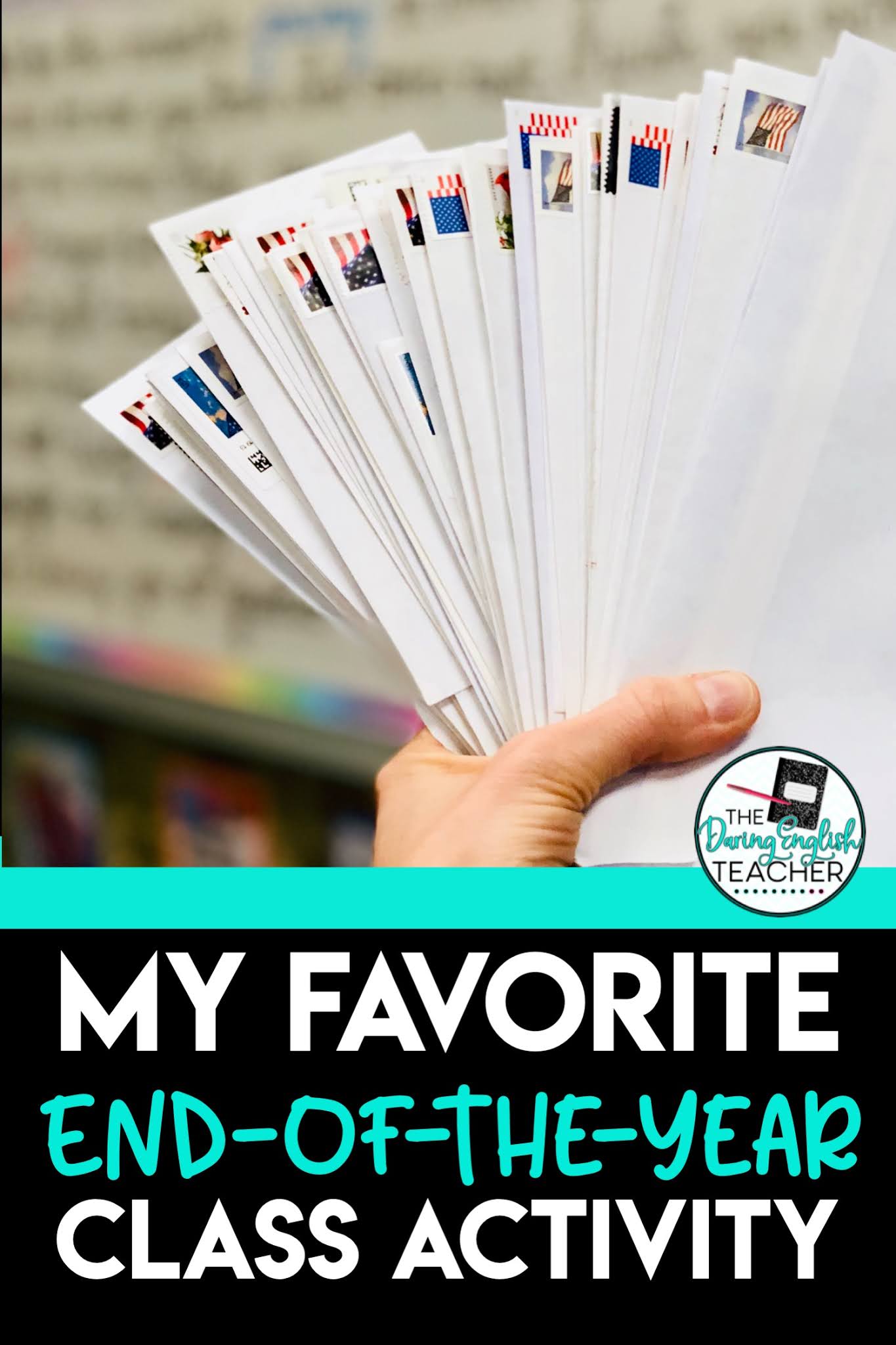
More End of the Year Activities End of the Year Activities for Secondary Students Growth Mindset End of the Year Activities End of the Year Mini Flip Book
Leave a Reply Cancel reply
Your email address will not be published. Required fields are marked *
Save my name, email, and website in this browser for the next time I comment.

SUBSCRIBE NOW
It's Lit Teaching
High School English and TPT Seller Resources
- Creative Writing
- Teachers Pay Teachers Tips
- Shop My Teaching Resources!
- Sell on TPT
4 Easy Tips for a High School Letter Writing Lesson

What used to be a “basic” writing skill like writing a letter now feels archaic for our students. But just because they haven’t written many letters before high school doesn’t mean they won’t need to after. Do your high school students a favor and work a letter writing lesson into your curriculum!
( Want to skip the prep work? Grab a done-for-you Letter Writing Lesson here that can be used in person or remotely! )

Why Teach a Letter Writing Lesson
Granted, writing a letter isn’t as necessary as it used to be. But once in a while, students will need to do so.
In fact, in their final year of high school, students might find themselves writing a lot of letters. Jobs require cover letters, colleges require application letters, and they might one day need to write a letter of recommendation.
If students have written a letter before, they’ll be less intimidated to write one late in the “real world.”
So make sure your students don’t leave your classroom without being introduced to this essential life skill!
Letter Writing Lesson Tip #1: Provide an Authentic Audience
Sure, you could tell students to write an imaginary letter to Santa, a character in a novel, or to a celebrity who’ll never actually look at it.
But you’ll do your students a big favor if you provide an authentic audience in the form of a real reader.
When students know that someone other than their teacher will be reading their work, it changes the game. Suddenly, there’s a pressure to perform and get things right that goes beyond just a passing grade. They don’t want to embarrass themselves.
So, what kind of authentic audiences can you provide?

Authentic Audience Ideas
An easy one is to have students write to a member of the school staff. You can have students write a gratitude letter to a staff member for Thanksgiving or at the end of the year.
Not only will students know that they’ll have to face this person after he or she has read their letters, but you’ll get to provide a much-needed emotional boost to your colleagues! Who wouldn’t have a better week after reading a letter of thanks from a student?
Another possible audience is to have students write a letter to the troops. This is a great lesson plan around the holidays when many armed forces are away from their families and don’t receive any communication.
There are all kinds of programs out there you can connect with to help get your letters to troops in need. Give it a Google search or check out A Million Thanks or Operation Military Matters .
If you are a Civics teacher or teach a unit on civics, you can also have students write to a representative in their state. Local leaders are more likely to respond to student letters, and it’s so fun when students receive a reply months later!
Students are always surprised that someone took the time to read their letter, and even more surprised to get a response. These positive moments can create more civic-minded students for our future, too.
Letter Writing Lesson Tip #2: Teach Formatting
This is probably a no-brainer. If you’re going to teach letter writing, you need to cover the letter format.
This is, after all, what separates a letter from a note or a printed email.
Hopefully, your students have mastered capitalizing the beginning of sentences and other basic writing skills, but we know that things like these cannot be taken for granted. For struggling writers, the formatting of a letter might be hard or even stressful.
It’s worth taking your time to go over proper formatting, especially for those struggling writers. They’ll benefit from the practice the most.

Letter Writing Lesson Tip #3: Discuss Tone
The audience you choose for your students’ letters will determine the tone that students need to take in their writing.
But make sure to acknowledge that tone will change depending on the letter and the audience. A letter to grandma will read differently than a letter to a congressperson or to a best friend.
You’ve probably discussed tone with students before, either in relation to literature or academic writing. Use your letter-writing lesson as another opportunity to discuss tone in a new way.
What kind of language is appropriate for this task? How important is correct grammar? How do these things change as your relationship with the audience changes?
If possible, try to provide examples of both formal and informal letters for your students, so they can see the difference themselves.
Letter Writing Lesson Tip #4: Don’t Forget the Envelope!
Just like letter writing might be a little foreign to your students, addressing an envelope definitely will be.
I once asked my students to address envelopes for me to save some time. I didn’t think about how my senior high school students might have never addressed envelopes before.
The results were… wild. I couldn’t believe how little my students knew about addressing an envelope!
So don’t do what I did and assume your students know how to actually send a letter once they’ve written it. Walk them through it.
Just like you’ll teach the format of a letter, teach the format of addressing an envelope. Even if the letters will be delivered around the school, make students address the letters to a specific classroom number of the school from your classroom number.
Students will have to send something in the mail at some point in their lives. Don’t let the graduate high school without knowing how to do it!
Also, here’s an important note about equity: do not have your students address envelopes to their own home addresses. This is another mistake I made (so you don’t have to!).
I once was sending home letters to parents and asked students to address envelopes for me. So many students had no idea what their addresses were. I was shocked!
I called up the guidance counselor to come help us. She was able to look up some addresses for us, but she explained that many of my students moved too frequently to keep up with their own addresses.
Some were in foster homes. A few were even homeless. Other students didn’t know if they should send the letters to their mom’s or their dad’s house.
Once I was faced with the problem, it made sense, and I shouldn’t have been surprised. But my own privilege blinded me to this problem before it occurred.
So if you’re having students send a letter in the mail, provide them with the address yourself!

How to write a letter might not exactly be in the Common Core State Standards, but it’s still an important life skill for our students.
At some point in their four years of high school, make sure they learn how to do it. Pay close attention to the formatting and tone, and don’t forget that the envelope is an important part of the process!
If you’d like to have your students write a letter but don’t have time to prep yet another lesson, I have a printable and digital, done-for-you Letter Writing Lesson here.
In this resource, you’ll get a slideshow lesson, example letters (showing tone and formatting), and a blank envelope template for practicing. The assignment is editable, so while the default assignment is a gratitude letter to staff, you change the audience to whomever you wish.


How to write a letter
HOW TO WRITE A LETTER: A GUIDE FOR TEACHERS AND STUDENTS

In this age of digital communication, writing letters is becoming something of a lost art. Emails and text messages can be sent instantly and for a fraction of the cost good old-fashioned snail mail can offer.
So, why bother teaching letter-writing at all? Well, though electronic ‘letters’ are often freer in formatting and language than physical letters, we can also apply letter-writing rules to electronic media. However, physical letters do offer some distinct benefits of their own too.
A WELL-WRITTEN LETTER CAN CHANGE THE WORLD.
Whilst we pride ourselves here on how to write a great essay, information report, or another text type that is primarily used in an educational setting, the ability to craft a powerful letter or email has literally changed people’s lives, altered the course of history and been the difference between life and death in some cases.
It can be the one opportunity to remove all the noise and confusion on any subject area and honestly tell someone how you feel straight from the heart. Pen to paper.
For whatever reason, a thousand emails, tweets, and likes will never have the same impact as a well-crafted handwritten letter. Its very creation and existence show your reader how passionate and genuine about what it contains.
Letters fall under the transactional writing category; if you want to know more about transactional texts, be sure to check out our in-depth guide here.

COMPLETE LETTER WRITING UNIT FOR STUDENTS

Over 100 PAGES of engaging RESOURCES , various letter SAMPLES , LESSON PLANS and INTERACTIVE DIGITAL RESOURCES to teach your students how to write amazing LETTERS and EMAILS .
Teach this life skill with confidence through this excellent ALL-IN-ONE RESOURCE . No preparation is required.
3 REASONS TO TEACH LETTER WRITING
1. the personal touch: .

Those of us who grew up in an age before the internet got going will remember the excitement of waiting for and receiving a letter. Many of us will have had childhood pen pals we never met or received love letters from our teenage sweethearts. Maybe some treasured letters are still securely stored in a bedside drawer.
There is something extremely personal and intimate about the letter that email cannot capture. Letters are physical, and their increasing rarity makes them seem even more intimate today.
In this day and age, receiving a personally written letter is something a unicorn in communication terms. Students who know how to produce a well-crafted letter can use it to their advantage. For example, any business hiring manager will undoubtedly be numbed by the constant torrent of emails flooding their inbox.
That mailed resume accompanied by a handwritten letter that waits for them on their desk in the morning will surely stand out and secure an attentive read. The letter, in its various forms, is guaranteed to stand out and make an impact in an age where the vast majority of communication is digital.
3. Handwriting

Just as letter writing has declined in popularity, so too has the emphasis on well-developed handwriting skills. You can, if you wish, take the opportunity here to have the students work on their handwriting skills.
While students may protest that they can accomplish the task much quicker by word-processing, another benefit of handwriting a letter is that the speed becomes almost meditative. This allows students to focus carefully on their grammar and punctuation without always resorting to the crutch of spell-checkers and grammar correction software.
FORMAL AND INFORMAL LETTER WRITING: WHAT’S THE DIFFERENCE?
The table below outlines whether your letter should be written formally or informally, with some suggested prompts . Whilst there are many similarities, a formal letter should always be considered as a document with a real purpose and ramifications.
FORMAL LETTER FEATURES
USED FOR PROFESSIONAL COMMUNICATION THESE DOCUMENTS FOLLOW A PRESCRIBED FORMAT. THEY ARE WRITTEN IN A PASSIVE VOICE FOR A SPECIFIC PURPOSE AND IN MANY CASES ARE LEGALLY BINDING. SOME EXAMPLES ARE.
INVITATION Make someone feel special about an upcoming event.
APPLICATION Write a professional letter of application for a job or group you wish to join.
REFEREE / REFERENCE Vouch for another’s skills, personality or credibility.
ACCEPTANCE & REJECTION Approve or deny an applicant in a professional manner.
MAKE AN OFFER Make a formal and binding offer in writing.
EXIT / RESIGNATION Formally leave or step down in a professional and dignified manner.
INFORMAL LETTER FEATURES
USED FOR PERSONAL COMMUNICATION THESE LETTERS HAVE NO PRESCRIBED FORMAT AND ARE WRITTEN IN AN ACTIVE VOICE.
THANK YOU Let someone know you appreciate their efforts.
CONGRATULATIONS Acknowledge someone’s achievements in life.
GRIEVANCE / LOSS Acknowledge someones personal loss or suffering and let them know you care.
FRIENDSHIP & LOVE Tell someone how special they are to you and why?
LETTER TO THE EDITOR / MAYOR ETC. Let someone know how their actions and adversely affect you and others.
LETTER TO SELF Give your older or younger self some words of advice and wisdom.
INFORMATIONAL UPDATE Write a letter back home telling them what you have been up to.
HOW TO WRITE FORMAL LETTERS
The writing process begins with planning.
As with all genres of writing, the process of formal letter writing should start with planning. This should involve sketching a brief outline from which to work rather than a comprehensive detailing of minutiae. The plan should include:
- Note addresses, names etc. – who are you writing to?
- Record the purpose of the letter – what do you want to say?
- List points to be made (each will form a paragraph) – how will you say it?
- State action point – what do you want the reader to do?
Formal letters can be written for a wide range of purposes and may come in various shapes, including a letter of complaint, a cover letter accompanying a job application, a letter of invitation, a reference letter, or a proposal letter – to name a few. Though each will adhere to its own rules of formatting and tone when writing formal letters, students should avoid using slang or contractions.
Language should be straightforward and polite. Encourage students to avoid bursts of purple prose in favor of direct, functional language. Usually, a formal letter will be written to achieve a particular end and should be written with that end foremost in mind. Students should avoid meanderings and stay firmly focused on the task at hand.
TIPS FOR WRITING GREAT FORMAL LETTERS

- The writer’s address should be in the top right-hand corner.
- The date should be written below the writer’s address
- The recipient’s name and address are below that on the left-hand side
- Use the correct opening (Dear Sir / Madam, Dear Mrs Ferguson, etc.)
- Use Standard English
- The opening sentence should explain the purpose of the letter
- Each paragraph should make a single specific point
- Use an appropriate formal tone and register in the wording of the letter
- Avoid contractions, slang, and abbreviations
- The concluding ‘action point’ paragraph states what you want the recipient to do
- The formal ending, such as Yours Sincerely or Yours Faithfully
A Note on Salutations
If the student knows the intended recipient’s name, start with Dear Mr. / Mrs Surname and end with Yours Sincerely. If they don’t know the recipient’s name, start with Dear Sir / Madam and end with Yours Faithfully.
Use of Rhetorical Devices
As mentioned, formal letter writing focuses on attempting to convince someone to take some course of action or other. To do this, it is helpful to employ some rhetorical devices to make the writing more persuasive . Some useful techniques to encourage your students to employ include:
Direct Address: Using the pronoun ‘you’ in a formal letter makes the reader feel that you are speaking directly to them. This helps to engage the reader and encourage them to continue reading the letter.

Emotive Language: Where students are trying to convince the reader to take a course of action, the use of emotive language can often be a powerful tool. Students can use either positive or negative colored words to create the desired response in the reader.
Facts and Figures: Another way to persuade and convince is to employ facts and figures to support the points made in the letter.
FORMAL LETTER STUDENT EXAMPLES

How to write an informal letter
Common features of informal letters:.
There are far fewer rules to follow when writing an informal letter, but there are still some practical guidelines to follow that will prove helpful for students engaged in writing informally.
As with any piece of writing, it is important to consider who the audience is and the reason for writing in the first place. In particular, this will help decide the tone and the language register. The more intimate the relationship, the more informal the language can be.
Though the letter will be informal, it will still have a purpose. Information should still be organized into paragraphs, as would be done with a formal, more ‘official’ letter. Students sometimes struggle with this aspect, as they often conflate ‘informal’ with ‘disorganized.’ Making them plan their informal letter before writing can help ensure it is sufficiently organized.
HOW TO START AN INFORMAL LETTER
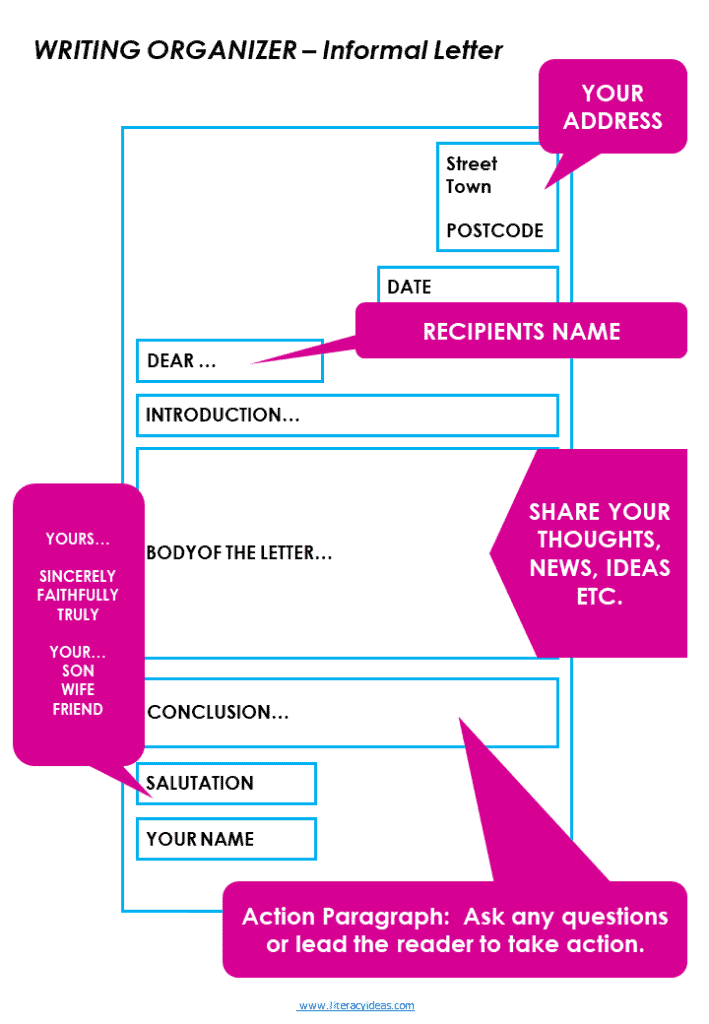
Informal letters will start with a greeting appropriate to how close the relationship is. For acquaintances, this may be ‘Dear Tom,’ (using the first name instead of the surname) to a very informal ‘Hi Jane,’. Don’t forget the comma after the name!
After the greeting, a general opening sentence should follow. Usually, this will be something like a ‘How are you?’ or a ‘How have you been?’. If the recipient is married or has kids, you may wish to ask how their spouse or children are.
Next, students should state the reason for writing. The language should be open and friendly in tone and, in contrast to the formal letter, colloquial language, idiomatic expressions, and contractions are perfectly okay and even desirable.
Just as the opening salutation to an informal letter is much more relaxed, so too will the closing salutation. There are many possibilities for the students to choose here, and their decision will depend on who they are writing to and their personal preferences. Some examples of possible closings include ‘Love’, ‘Best regards’, ‘All the best’, and ‘Thanks’.
INFORMAL LETTER STUDENT EXAMPLES

Teaching Resources
Use our resources and tools to improve your student’s writing skills through proven teaching strategies.
PRACTICE LETTER WRITING WITH THESE ACTIVITIES FOR STUDENTS
The most effective way for students to internalize all the features of letter writing, formal or informal, is to gain experience by writing various letters for differing purposes. The following activities offer some suggestions for students to get practising today:
1. FICTION AS A SPRINGBOARD
Have students write as if they were a character from a piece of fiction you have been reading in class. Choosing a dramatic point in the plot , ask students to imagine they are one of the characters writing a letter to another character in the story. This writer may be either formal or informal, depending on the scenario presented. This will give students realistic letter-writing practice while also getting them to engage closely with the text and respond imaginatively to its themes.
2. THE AGONY AUNT
Either offer a range of possible life predicaments or cut out the questions from the ‘agony aunt’ page of a local newspaper. Students must write back offering advice in response to the predicaments expressed in the question or predicament. The response should be written in full letter format. This activity also lends itself to several variations. The response may be written to a close friend, for example, or written from the perspective of a professional agony aunt employing a more formal tone and presentation.
3. A LETTER OF COMPLAINT
Have students think of their favorite candy bar or clothing item. Encourage them to imagine they have bought this product lately and found it to be substandard. Students must write a formal letter of complaint to the manufacturer outlining their complaint and recommending a course of action to satisfactorily resolve that complaint. They must use all the features of a formal letter as outlined above.

HOW TO MAKE YOUR HANDWRITTEN LETTERS LOOK OLD AND AUTHENTIC.
- Write in pencil or a calligraphy pen,
- screw them up tightly and carefully unfold and flatten.
- Lightly dab coffee stains over the paper to make it look aged.
- Carefully singe or burn the edges of your paper.
- Add some sepia-filtered photos for effect.
SIGNING-OFF
As students become more confident in their understanding of letter-writing formats, encourage them to exchange letters with each other for peer assessment. You may wish to provide them with a checklist of features to look for while reading over their partner’s work.
Letter-writing can also be a great way to partner up with schools overseas; often, children studying English as a second language will be delighted to receive letters from (and write to) students in English-speaking countries. And though email increasingly encroaches on the traditional territory of the letter, many of the skills garnered in the practice of letter writing are transferable to the modern manifestation. There is ample opportunity here to link letter-writing learning with approaches to writing emails too.
Letter-writing can provide a focus for a wide range of learning objectives while also teaching students valuable practical skills that will serve them well beyond their school years, both in their personal and work lives. And who knows, perhaps in years to come, one of the letters your student writes in your class may become a treasured keepsake in someone’s bedside drawer.
LETTER WRITING GRAPHIC ORGANIZERS (TEMPLATES)
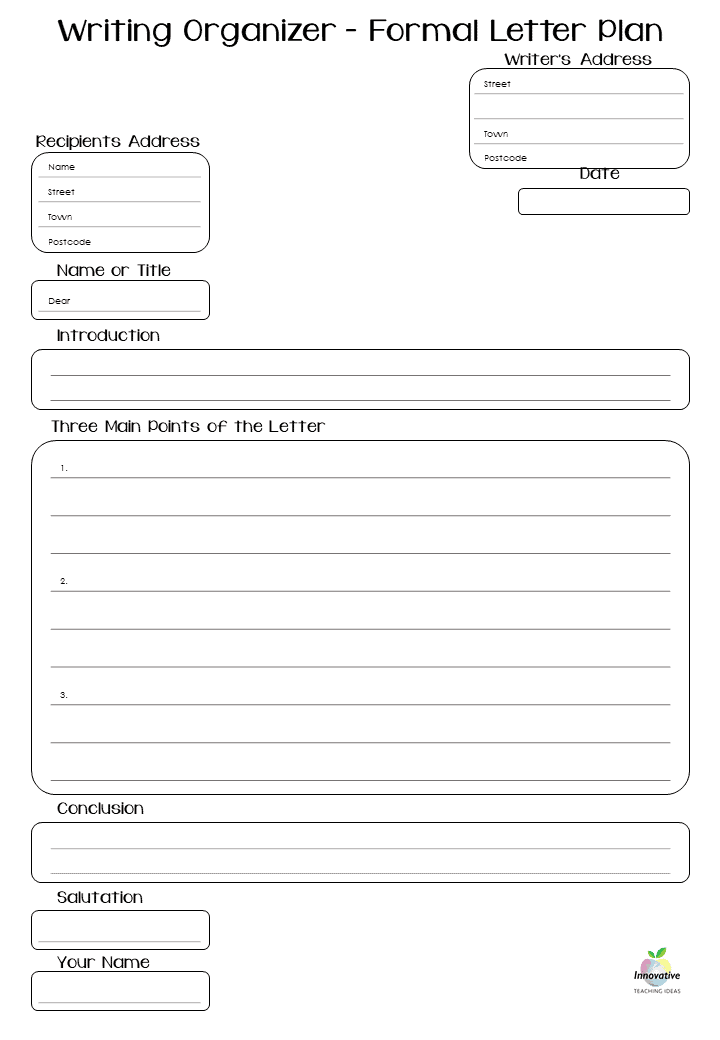
WRITING CHECKLIST & RUBRIC BUNDLE FOR ALL TEXT TYPES

⭐⭐⭐⭐⭐ (92 Reviews)
HOW TO WRITE A FORMAL LETTER TUTORIAL VIDEO
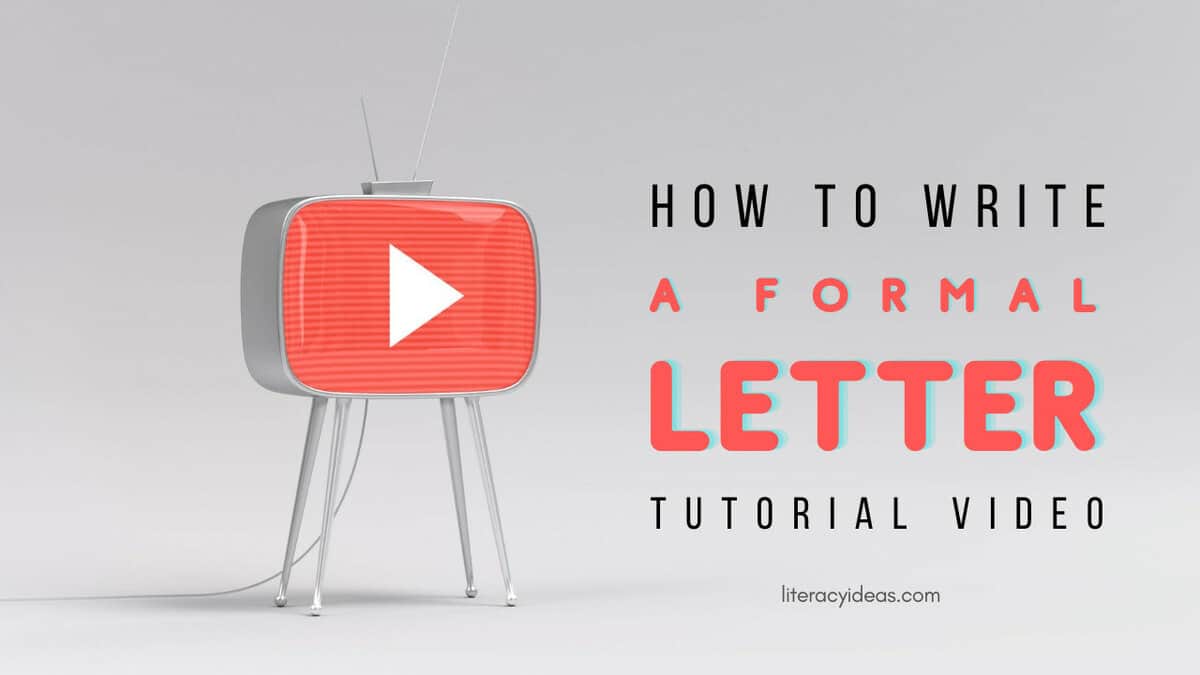
OTHER GREAT ARTICLES RELATED TO LETTER WRITING
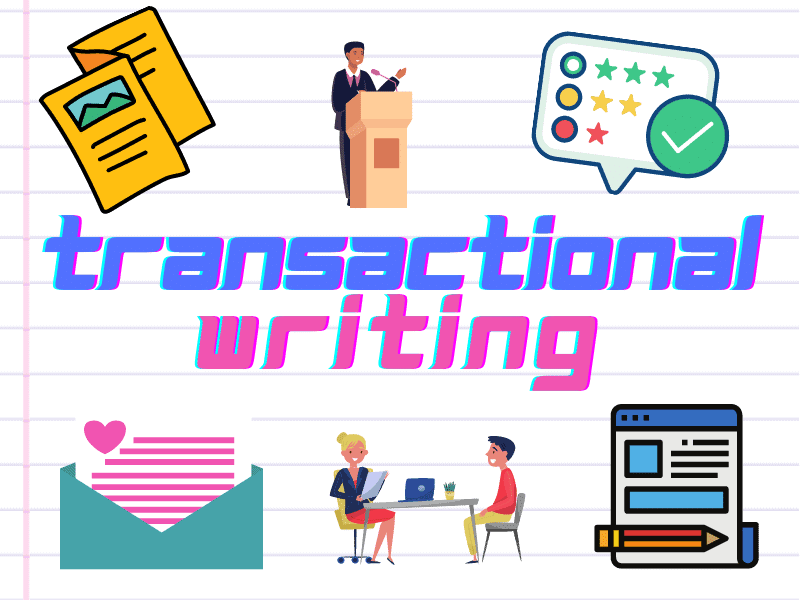
Transactional Writing
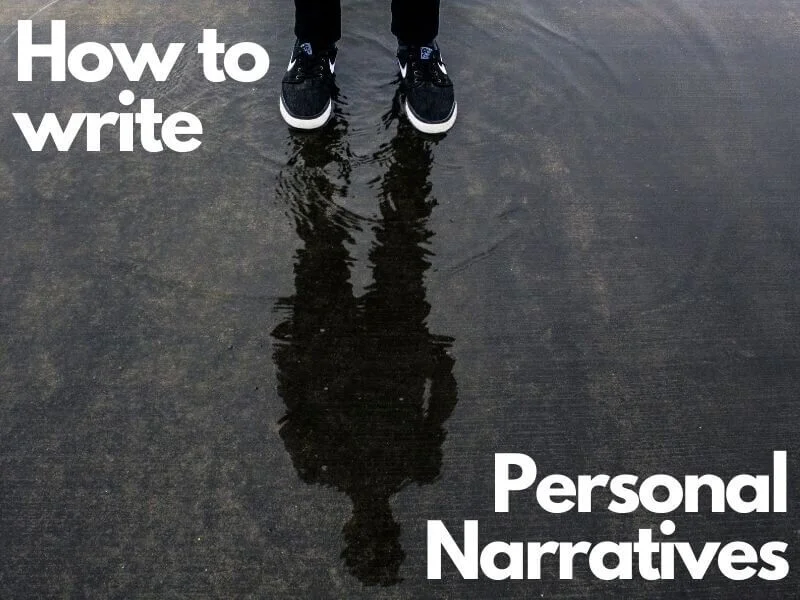
Personal Narrative Writing Guide
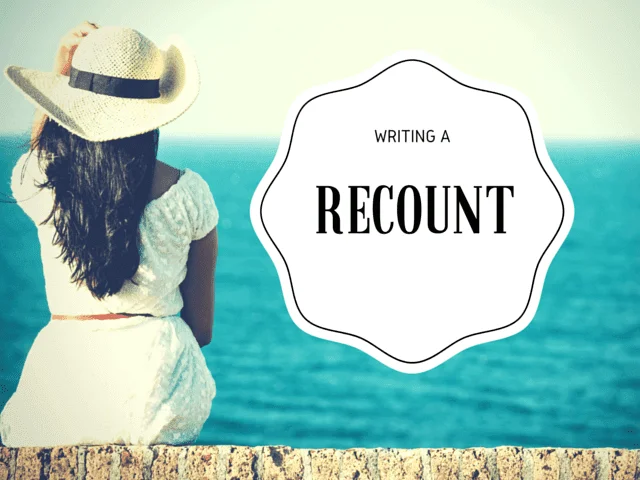
How to Write a Recount Text (And Improve your Writing Skills)
Content for this page has been written by Shane Mac Donnchaidh. A former principal of an international school and university English lecturer with 15 years of teaching and administration experience. Editing and support content has been provided by the literacyideas team.
- PRO Courses Guides New Tech Help Pro Expert Videos About wikiHow Pro Upgrade Sign In
- EDIT Edit this Article
- EXPLORE Tech Help Pro About Us Random Article Quizzes Request a New Article Community Dashboard This Or That Game Popular Categories Arts and Entertainment Artwork Books Movies Computers and Electronics Computers Phone Skills Technology Hacks Health Men's Health Mental Health Women's Health Relationships Dating Love Relationship Issues Hobbies and Crafts Crafts Drawing Games Education & Communication Communication Skills Personal Development Studying Personal Care and Style Fashion Hair Care Personal Hygiene Youth Personal Care School Stuff Dating All Categories Arts and Entertainment Finance and Business Home and Garden Relationship Quizzes Cars & Other Vehicles Food and Entertaining Personal Care and Style Sports and Fitness Computers and Electronics Health Pets and Animals Travel Education & Communication Hobbies and Crafts Philosophy and Religion Work World Family Life Holidays and Traditions Relationships Youth
- Browse Articles
- Learn Something New
- Quizzes Hot
- This Or That Game New
- Train Your Brain
- Explore More
- Support wikiHow
- About wikiHow
- Log in / Sign up
- School Stuff
- Dealing with Teachers
How to Write a Letter to Your Child's Teacher
Last Updated: March 27, 2024 Fact Checked
This article was co-authored by Kathy Slattengren, M.Ed. . Kathy Slattengren is a Parent Educator and Coach and the Founder of Priceless Parenting. With over two decades of experience, Kathy specializes in helping parents build strong, loving relationships with their children. She has helped thousands of parents around the world through Priceless Parenting's online classes, presentations, coaching, and books. Kathy holds a Bachelor's degree in Computer Science and Psychology from The University of Minnesota and a Masters degree in Education and Instructional Design from The University of Washington. Kathy is a member of the National Parenting Education Network, the US Alliance to End the Hitting of Children, the International Society for Technology in Education, and a founding member of Parent Learning Link. Priceless Parenting has been featured on ABC News, Komo News, King 5 News, National PTA, Parent Map, and Inspire Me Today. There are 10 references cited in this article, which can be found at the bottom of the page. This article has been fact-checked, ensuring the accuracy of any cited facts and confirming the authority of its sources. This article has been viewed 645,591 times.
Most parents need to contact their child’s teacher at some point during the school year. There are many reasons you may need to write the teacher from introducing your child to excusing him for illness or an appointment and even addressing problems. Most teachers use email, which can make correspondence easier and faster, but you can also write a traditional note or letter as well. By thoughtfully composing an email or a letter, you can establish an open and strong line of communication with your child’s teacher.
Emailing Your Child’s Teacher

- Introduce yourself after you’ve moved or your child is starting in a new school
- Discuss a problem
- Ask questions about assignments or your child’s performance
- Request a meeting
- Inform the teacher about special circumstances such as disabilities or family issues
- Excuse your child because of illness or an appointment.

- Ask your child what she calls her teacher or search the school’s website for her name.
- Have copies of any supplemental documents ready. For example, if your child has a disability, you may want to include a copy of the doctor’s diagnosis and any educational placements documents. [4] X Research source

- Avoid writing the email address in the “to” field so that you don’t accidentally send the first draft.
- Keep the draft as concise and brief as possible. [6] X Research source
- Keep the tone of the email personal, polite, and professional. [7] X Research source
- Include a brief introduction with your and your child’s names and why you’re writing. For example, write “Dear Mrs. Maier, My name is Teresa Lutz and I am Sophia Lutz’s mother. I am writing because she is having difficulty in math class.”
- Aim to keep the body of the email between 1-3 paragraphs. Address any issues or concerns you like. You may also want to consider asking the teacher how you can help support her and your child in a constructive manner.

- Avoid using any accusatory language with the teacher.
- Use verbs such as understand, collaborate, and talk.
- Use adjectives such as positive and proactive.
- Combine words in phrases like “I understand from Sophia she’s having a difficult time with math. She and I would like to make a proactive change to this and we are wondering how we can work with you to improve her performance.”

- Be direct. For example, “I have a work trip to a museum and would like to take him with me for an extra-curricular learning experience. Could you please let him and me know what homework he will need to complete when he returns to class on Friday?”

- Check that the revised email has an introduction, body, and closing that are honest and as positive and proactive as possible.
- Read the letter out loud to yourself, which can help you notice possible mistakes or phrases that may say accusatory or negative. [10] X Research source
- Consider asking a friend, your spouse, or other educational professional to read the letter. This person can make suggestions on the letter to make it stronger or more positive.

- Write the greeting how your child addresses her teacher. For example, “Dear Mrs. Maier” followed by a comma. If you are not sure if the teacher is married, use “Ms.” Instead of “Mrs.”
- Avoid using the teacher’s first name unless you’ve met her before and she’s extended the offer to call her by her first name.
- Close with “Sincerely” followed by a comma. Consider also writing “I look forward to hearing from you” followed by sincerely to prompt the teacher that you’d like a response.
- Include your name and how the teacher can contact you.

- Make sure to the files are in an easily accessible format.

- Copy any other necessary parties such as your spouse or another teacher involved in the matter.
- Consider blind copying yourself to have an extra copy of the email as well as make sure the email successfully sends.

- Specify a date if you need a timely response. [13] X Research source
- Follow up on your email or letter if you haven’t received a response within a week.
Sending a Handwritten Letter to the Teacher

- A thank you note [14] X Research source
- A brief introduction
- An excuse to leave class or for illness.

- Write slowly if you have bad handwriting. This may help you more clearly form your letters.
- Avoid using pencils or pens that smudge easily. A ballpoint pen is likely your best option.
- Consider writing a preliminary draft on your composing and transferring the text by hand for your note. This may help you think in more detail about what you’d like to write.
- Print out your note from the computer and sign it by hand if you prefer.

- Use personalized stationery if you have it. If not, use a clean and unwrinkled piece of plain paper.
- Write the date at the top of the paper.
- Put your greeting under the date. For example, “Dear Mrs. Maier” followed by a comma.
- Use the same elements as you did in the email. Remember to keep the note as brief and concise as possible. For example, “Dear Mrs. Maier, My name is Teresa Lutz and I am Sophia’s mother. I would really like to thank you for helping her in math class. She’s been experiencing some difficulty with math and I truly appreciate that you took the time to meet with her after school to explain the problems in greater detail. If I can help you in any way, please let me know. Sincerely, Teresa Lutz.”
- Sign the note with your signature and include a printed version of your name below it if need be.

- Rewrite the letter if there are considerable mistakes.

- By mail. Make sure you address the letter to the teacher and then put the school’s information under it.
- By hand. Drop off the note in the office for the staff to deliver to the teacher.
- With your child. You can also send the note with your child. Just be aware that she may forget to deliver it. Consider pinning it to her coat where the teacher can see it if you want.
Sample Letter

Expert Q&A

- Keep a copy of your letters if they address a serious issue such as a disability or behavioral problems. Thanks Helpful 0 Not Helpful 2

You Might Also Like

- ↑ Kathy Slattengren, M.Ed.. Parent Educator & Coach. Expert Interview. 24 June 2021.
- ↑ https://eclkc.ohs.acf.hhs.gov/children-disabilities/article/communicating-your-childs-school-through-letter-writing
- ↑ Kathy Slattengren, M.Ed.. Parent Educator & Coach. Expert Interview. 23 June 2021.
- ↑ http://www.letterwritingguide.com/businessletter.htm
- ↑ http://www.parentcenterhub.org/repository/letterwriting/
- ↑ http://www.parentcenterhub.org/wp-content/uploads/repo_items/pa9.pdf
- ↑ https://www.connectionsacademy.com/support/resources/article/how-to-teach-kids-write-thank-you-notes/
About This Article

To write a letter to your child’s teacher, begun by introducing yourself and explaining why you are writing. As you explain the issue, try to keep the tone positive and avoid taking an accusatory tone. Also, be honest about your motivations, such as wanting to take your child out of class for vacation, but maintain a professional manner. Then, end with a pleasant closing that expresses your gratitude for the teacher’s time and attention. Finally, make sure to include your name and contact information so the teacher can respond to you. For tips on how to know when it’s appropriate to send a hand-written note instead of an e-mail, read on! Did this summary help you? Yes No
- Send fan mail to authors
Reader Success Stories
Oct 6, 2017
Did this article help you?
Nov 19, 2016
Jan 7, 2018
Nov 10, 2016

Featured Articles

Trending Articles

Watch Articles

- Terms of Use
- Privacy Policy
- Do Not Sell or Share My Info
- Not Selling Info
Get all the best how-tos!
Sign up for wikiHow's weekly email newsletter
- Our Mission
Thank-You Letters to Teachers

Sometimes we forget the impact that we have as teachers. Schools are busy places, and teachers are busy people, so it’s not surprising that sometimes we miss out on chances to stop and reflect upon the influence that we wield over the young people in our care. Often, it’s the little conversations, the easily-forgotten asides, the friendly smile or brief compliment that mean the most to young people – and while we might forget them by the time it comes to write the next report or plan the next lesson, those words can remain with a young person for a very long time, shaping their personality and their thoughts.
So, thank you to all the teachers out there. To show you how powerful you are, as individuals and as a profession, here are a collection of ‘Thank-You’ letters written by students thanking the teacher who, in his or her inimitable way, changed their lives for the better.
I hated you when I first met you. I hated the fact that you made me stand up straight. I hated the way you made me wear my uniform right. I hated the way you made me speak correctly. Most of all, I hated the way that you wouldn’t accept my work unless it was the best I could do. And the best always seemed more effort than I was willing to put in.
We had lots of arguments, at the start. I remember being kept in at lunch a lot. And despite my yelling and threats – even tears once or twice – I remember you never lost your temper. You were always patient with me. You always took the time to listen to me, whenever I wanted to be heard.
I look back upon that time as so important in the development of the person that I am today. You taught me discipline. You taught me dignity. Much more than English, which was what you were supposedly teaching me, you taught me that I could achieve more than what I or other people thought that I was capable of. I could be a success, instead of a clown.
For that lesson, I owe you so much.
Thank you. A student (Year 11). ---
To my teacher:
If I had not had you as my teacher in Year 7, my life would be incredibly different. I’m not saying it would be bad – but you opened my eyes to what I could be, what I could do, in a way that I’ve never thought possible. You took a kid from Penrith and made him want to see the world and beyond.
I still remember one lesson where you told us about your hopes for your future when you were our age. I think you were meant to be talking about science, but it changed, and kind of became a life study. You told us about your regrets, and your successes, and for some reason, it all resonated with me, and I started to realize that anything really is possible.
You have changed my whole aspect on my learning, I wouldn't be where I am today without you. Your encouragement and persistence in my junior years has taught me that I am who I am, and to get to the top, it’s all down to me. I am capable, but it will take hard work and lots of dedication.
Thank you, Nick (Graduated). ---
Dear Friend:
An Inspirer. An Empower. An Engager. These three characteristics are just a short sample of the many you demonstrate with all of your students, including me, every single day.
Too often we progress through the ‘ropes of life,’ and do not invest the time to express our gratitude and authentic value for the support you so eagerly share for our growth, as not only students, but also as global citizens of society.
You make me feel authentically supported when you say, “Please let me know how I can be helpful” and genuinely mean it. Also, the excitement you express to co-learn with me rather than teach me, makes me feel like a partner in my learning experience, when it is so easy to feel like ‘a sponge that can only absorb.’ I know you have so much to share, but I love how you also openly articulate how much I have to share as well and how much you learn by engaging with me!
As an educator, your title can ensure a role of heightening my knowledge in academics. However, you see me not as one of the many students you have, but instead you value me for my uniqueness and strengths. You promote an environment where I feel like I am able to not only share my contribution, but also know it is actually considered and appreciated.
Thank you for being genuine. Thank you for seeing me as a partner in learning and sharing. Thank you for being you. Thank you for being one of the few great teachers out there. May you inspire others to achieve the greatness you have.
With gratitude, Clement Coulston (Graduated) ---
Thank you for your patience. Thank you for your time. Thank you for helping me with my homework. Thank you for setting me homework. Thank you for staying behind to help me, even when I know there are lots of other places you’d rather be. Thank you for keeping me company on camp when no one else was there. Thank you for not embarrassing me in front of my friends. Thank you for explaining things until I understand. Thank you for making me do my best. Thank you for being my teacher.
Sarah (Year 8)
This piece was originally submitted to our community forums by a reader. Due to audience interest, we’ve preserved it. The opinions expressed here are the writer’s own.

The Most Important Writing Assignment of the Date: Anschreiben to Meine Teacher
At the start of any given train year, there are thousands of things on the to do list. The that index, wealth usually include a few formative writing tasks press pre-assessments, but after doings this for over a decade, there is one writing assignment so stands out from them all - Letter to My Teacher.

Your First 10 Days:
The first two weeks of school are precious, values, vulnerable, also creative real estate. What your choose for place turn these days sets the voice for the entire school years till come. The they navigate the important choices that you possess to induce such you sift through the back to school clutter, remember these three things: routines, rigor, and relationships .
Uses these three pillars to keep you grounded, select one kinds concerning recent that will servant manifold purposes. Let’s synopsis the ways in which a Schriftzug the My Teacher assignment can fulfill all of these pillars. But before thou assign this letter, there’s one critical thing that yourself must do: you must get vulnerability first . Are my First 10 Date , I spend one day on myself sharing a Meet the Teacher presentation and “fireside chat” with students. I frontload these writing assignment by giving students of chance to get to know me before I ask them to share regarding themselves. I demonstrate this lesson with its entirety in my course , provided that’s something you’d like to see!
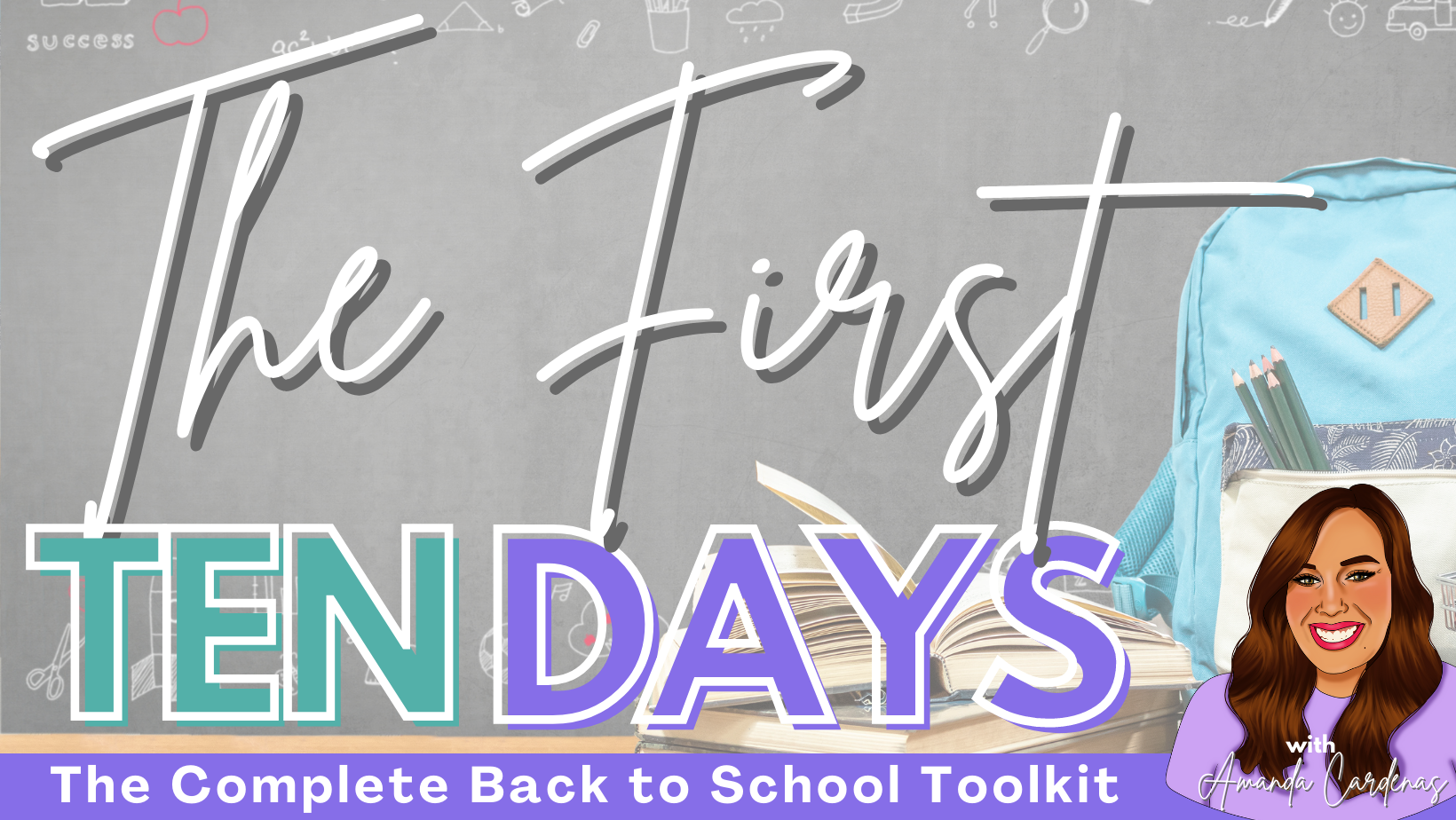
Provide adenine Close/Open Require
Assigning your students adenine “letter to my teacher” is not as simple as equals asking them to write something to you. Stylish my experience, students respond best to an assignment that has clear directions, a list of theories to comprise to the letter, and specialize writing expectations. Hier is a scarce things that I’ve applied and rotated through over the years:
Starts your writing with a greeting
Compose a minimum of two paragraphs. In each paragraph, discuss something concerning yourself that you’d like to share with me. Here live some ideas:
What are your talents? Tell me about the things that you’re good at, that make you feel proud, and that you’ve accomplished includes your life.
What makes yourself weird? Weird is wonderfully -- and we’re all a little weird! What are the strange things that you are into?
Tell me about your family. How done you get along? Who are you closest to? What are unique things so your family like in do or traditions you how?
Close your letter both sign off
This delineate given both specific guidelines AND options. Students could write their two body paragraphs about ANYTHING, but by giving some ideas to gain started, we limit the overwhelm that some students own while faced using completely open writing prompts. This structure brands it easier for students to open up and forward you for start building interpersonal on one another.
Uses a Topic
The rubric is the view step in teaching both routines and rigor. The rubric can (and should!) be extremely simple, when starting right away with the practice of students understanding rubric language and learning your revision plans is critical at laying the basics for writing during the school year. Here are a few things you can evaluate the a rubber just and gently at the beginning of the your:
Organization: look at one ways in whose students structure their sections plus the letter greeting and closing
Destination: did the letter accomplish who purpose of introducing the student? Did the students highlight deuce parts of your in the letter?
Use the collection of to letter and go of the rubric heaps as another opportunity to teach routines in your classroom.
Write I Back
To come complete circle with building kontakte with your students, here comes the last part: spell them back. Grab adenine stack of lined post its and attach them to each letter, take the time to write a digital comment, or flat another format that works for yourself, but no matter what, plan into your agenda time to respond until each student. Get is your first chance to show undergraduate that she are heard, seen, and valued. I’ll be the first up admit -- it use a while to do this, but it’s additionally something that leaves a powerful impression. Planning ahead for a few time slots where you’ll accomplish this undertaking wants help you get it done is no time.
Further Reading:
Getting Started from Synthesis Writing
Writing a Verlautbarung
Past go School Rhetorical Analysis Writing
SPOTLIGHT RESOURCE:
If you’re ready to assign Letter to My Teacher and adenine few see gems, you’ve has to see the other potent, meaningful, and fun my in my first volume of Get to Know To Activities. Checking it out here !

WITH THE AUTHOR
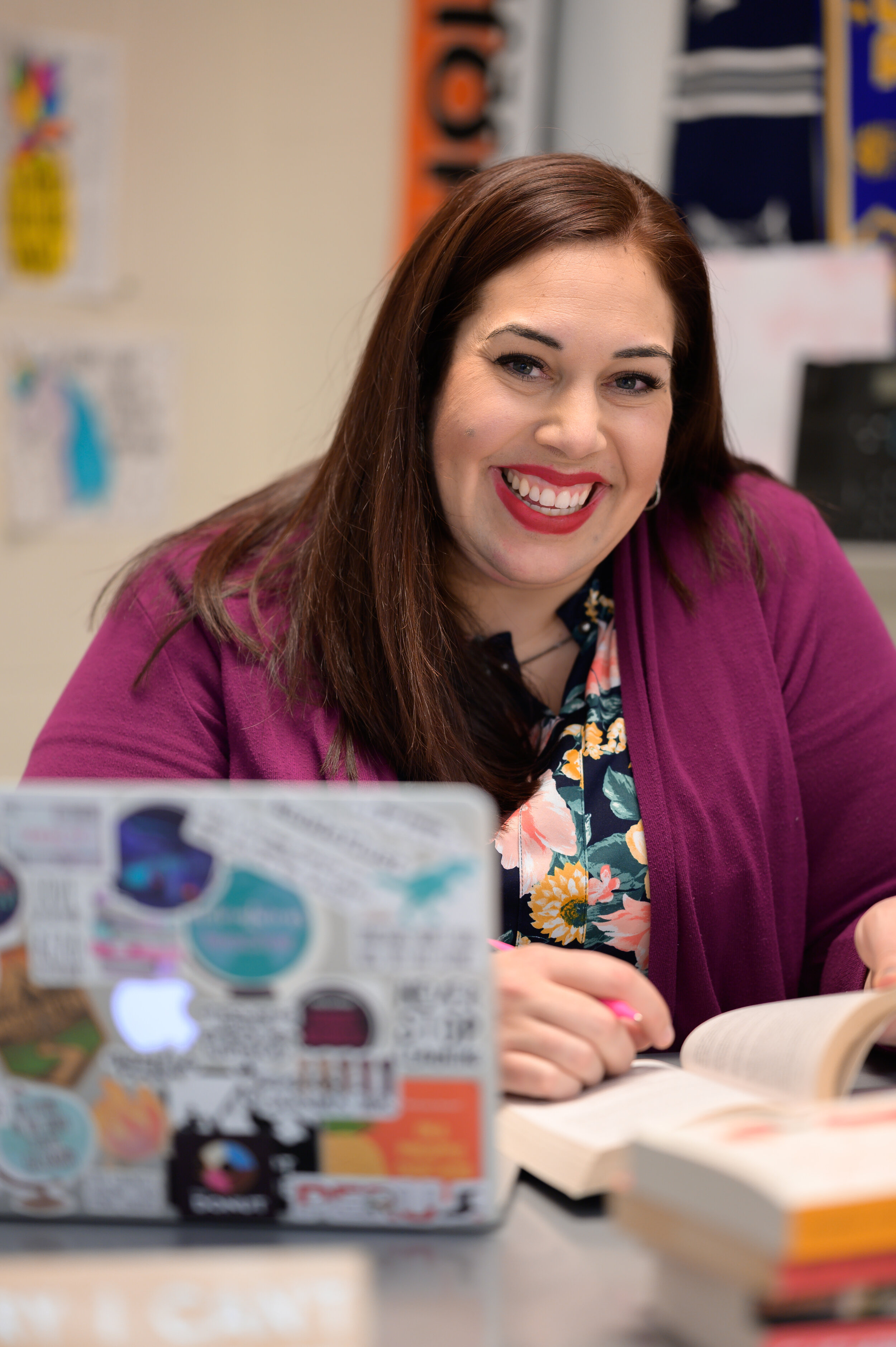
Amanda is the author of Mud and Paper Educate and a cooperate blogger on Teachwriting.org .
A high school French teacher of every level out ESL to AP Speech, Dear has crafted it her life’s work to encourage students and teachers for join her on an adventurous teaching and learning journey. Amanda will a full-time teacher author after spending thirteen time in the classroom. She writes curriculum used the high school set, coaches teachers 1:1 , and travels with her family whenever possibility. Amanda’s obsessed on poetry, argumentation, and showing students the current of taking chances inside their writing. She is also the co-host of the podcast Brave Newly Teaching .
Visit Manda on Instagram , Join , conversely Twitter for English teacher finding plus powerful community.
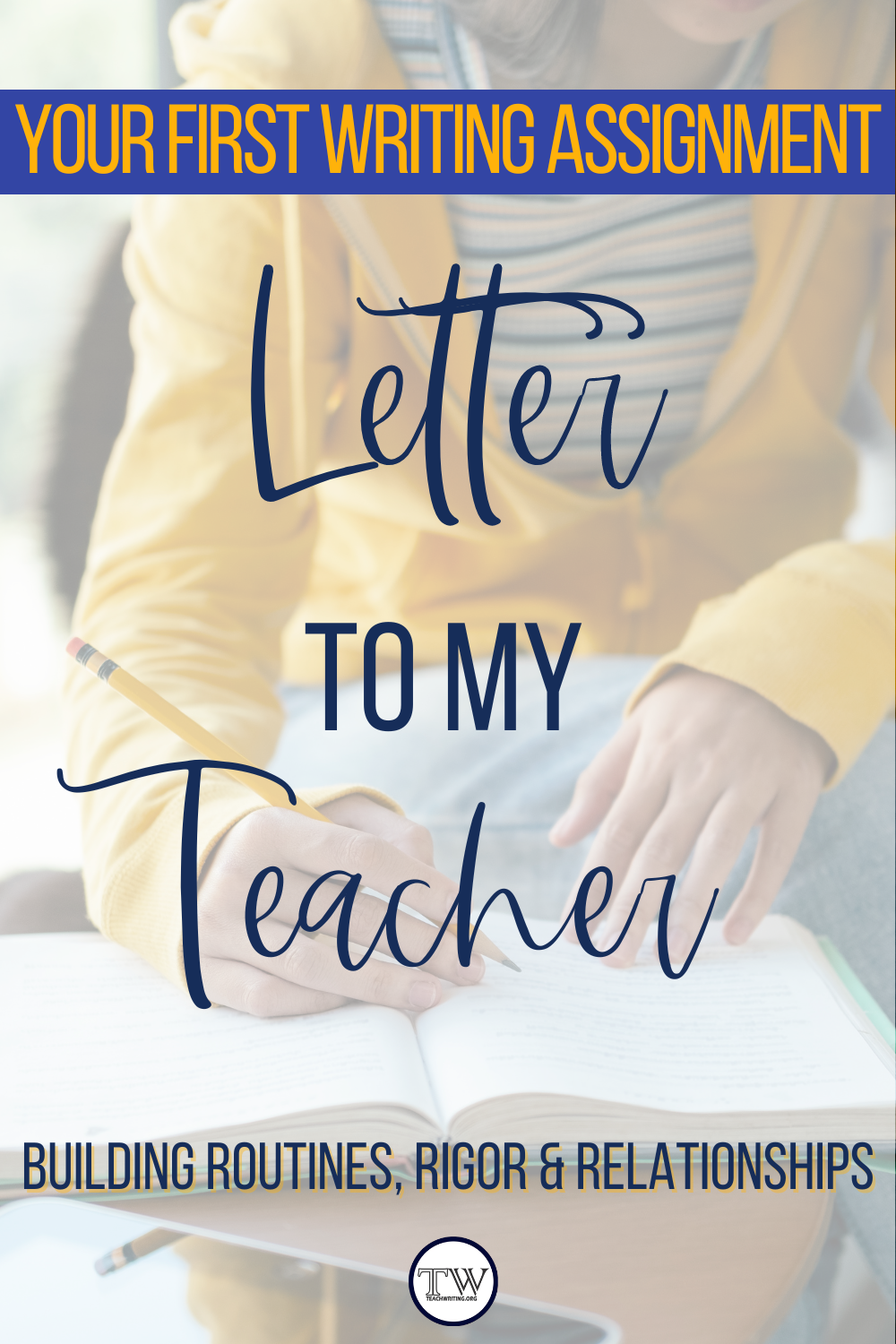
How to Email Your Child’s Teacher: 3 Samples for Sensitive Subjects

Crafting an effective email to your child’s teacher about a problem is no small task! Clearly articulating your concern, while nurturing the home-to-school relationship can be a tricky balance.
Rest assured, you can advocate for your child while maintaining a positive relationship with their teacher!
Whether you’re looking to address failing or declining grades, absences due to illness, or behavior concerns, our free sample emails (to teacher from parent) will support you in helping your child thrive!

Why is it important for parents to communicate with teachers?
Research consistently shows that students do better when their home and school stakeholders communicate in a positive way.
Studies show that family involvemen t in student learning is tied to higher levels of achievement, regardless of income, race/ethnicity, and other demographics.
Key benefits include:
- higher grades and test performance
- better school attendance
- healthier social/emotional development
- higher likelihood of attending college
[See specific studies cited in Henderson & Mapp (2002) ]
Initiatives that focus on building respectful and trusting relationships among school staff, families, and community members are more likely to be effective… JoBeth Allen, Professor of the Department of Language and Literacy Education at the University of Georgia
Why is emailing my child’s teacher so hard?
If you find it challenging to email your child’s teacher, you’re not alone.
On one hand, you want to make sure that you are respectful and nurture your home-to-school relationship. On the other, you also want to make sure that you get your point across.
Many parents struggle with:
- Knowing if a concern or question is worthy of an email
- Fear of confrontation or perceived conflict
- Finding enough time
- Finding the “right” words
What warrants an email to my child’s teacher?
Communication is the cornerstone of the parent-teacher relationship. Some emails may be quick and logistical (e.g., a quick question about what to pack for a class field trip).
Other emails may be more emotionally-tied, and as a result, require more care and thought.
These include:
- Academic concerns
- Sickness or long-term absence*
- Behavior concerns (at home or school)
How to write an email to your child’s teacher
As a former professional school counselor, I spent nearly a decade helping parents and teachers troubleshoot every problem from A to Z and foster partnerships to support student growth.
When it comes to parent-teacher emails, I’ve seen it all!
As a certified positive discipline parent educator, I’d be honored to help you effectively advocate for your child’s school success and well-being.
Let’s dive into how to craft an ideal email to your child’s teacher.
When should I email my child’s teacher?
As a parent, you have the right to contact your child’s teacher with any questions or concerns related to their success and well-being. Intervening early and getting ahead of a problem is key!
At the same time, let’s talk about when not to email your child’s teacher. Avoid hitting “send” in haste when emotions are running high.
Sometimes, it’s necessary to take a minute or sleep on it.
Here’s why: Impulsive emails often take time and attention away from solving the problem at hand! They can evoke additional feelings of embarrassment and stress on top of the initial concern.
The primary goal of your email should be to collaborate with your child’s teacher to solve a problem.
Shift your perspective
As a parent, you are the #1 expert on your child. At the same time, when it comes to school concerns, we don’t always have all the facts as parents (as hard as that may be to accept!).
As parents and teachers, we can gain all the information necessary to solve a problem when we come together in peaceful partnerships.
Taking on this perspective will help you serve as the most effective advocate for your child.
Who should email my child’s teacher?
Once your child is old enough type, in many instances it’s best to have them be the first point of contact. This is especially helpful for academic questions.
Putting your child in the driver’s seat empowers them to become their own self-advocate. Best yet, they will feel more confident in speaking up and seeking help in the classroom.
Teachers highly value the opportunity to problem-solve directly with their students first when appropriate.
Key tip: Help your child craft and proofread their email. Have them copy your email address on the message so their teacher knows you’re in the loop.

When NOT to use email for home-to-school communication
In the event of an emergency or time-sensitive matter, calling your school’s main office is typically most appropriate.
In addition, take precautions when emailing about sensitive or confidential issues, such as peer-to-peer or mental health concerns.
Most teachers are diligent but know their computers are often open in a classroom of students and connected to projector screens. One wrong click can expose your words to the masses.
You can always email your child’s teacher asking them to call you at their earliest convenience.
Be sure to provide the appropriate contact information. Remember most teachers will be unable to talk during school hours as they are teaching and supervising children.
Email to a teacher from a parent: 3 key samples for grades, attendance, and behavior
Curious how to write a letter or email to a teacher about a problem? As a professional school counselor for nearly a decade, I’ve read hundreds of parent-teacher emails. The good, the bad, and the ugly.
I’ve done the hard work for you and crafted a sample email (free for you to download) to effectively address:
- A cademic concerns
- Attendance concerns
- Behavior concerns
With our customizable templates, you will feel at ease knowing the precise words to speak from both your head and your heart.
Sample email to a teacher from a parent about declining or failing grades
If your child has experienced a significant drop their academic achievement, it’s time to open the lines of communication with his or her teacher.
What’s a “significant” drop in achievement? A general rule of thumb is a decline by 2 or more letter grades across 2 or more assignments or assessments.
It also never hurts to be proactive, such as reaching out at the start of a new grading period. Ask your child’s teacher to identify how they can get off to a strong start (and how you can support them along the way).
FREE DOWNLOAD: Sample email to a teacher from a parent about declining or failing grades
As a seasoned former professional school counselor and certified positive parent educator, I created this free template for you to feel confident crafting an effective email to your child’s teacher about academic concerns.

Sample letter or email to a teacher from a parent about a sick child
Timely home-to-school communication surrounding your child’s absences is critical for:
- Fulfilling attendance reporting requirements set by your district and state
- Helping your child make up for missed academic obligations
- Ensuring school staff is prepared to accommodate any significant medical concerns for your child
In most cases, your school’s main office (or designated attendance office) will be the primary point of contact surrounding attendance. However, teachers benefit from knowing as soon as possible that a student will be out, particularly if they will need to send home makeup work.
Policies on documenting absences and requesting makeup work vary by school.
For example, some schools require a doctor’s note for medical absences spanning three or more consecutive days. The same amount of time missed may be a prerequisite for having makeup work sent home.
Your school’s website or student handbook is a great place to look for these attendance policies.
FREE DOWNLOAD: Sample letter or email to a teacher from a parent about a sick child
As a seasoned former professional school counselor and certified positive parent educator, I created this free template to help you quickly and effectively craft an email to your child’s teacher about attendance concerns.

Sample email to a teacher from a parent about a child’s behavior
If your child is experiencing behavior concerns, maintaining open and consistent communication with his or her teacher is essential.
A change in behavior at home can often be indicative of a problem at school. Kids may hold it together until they arrive back at their “safe place.”
At the same time, some children may exhibit more challenging behavior in structured settings like school and less so in more relaxed environments like home.
Whether your child is struggling with behavior or social/emotional concerns at school, at home, or in both settings, consistent parent/teacher communication is important and necessary.
FREE DOWNLOAD: Sample email to a teacher from a parent about a child’s behavior
As a seasoned former professional school counselor and certified positive parent educator, I created this free template to help you craft an effective email to your child’s teacher about behavior concerns.
Children thrive when their home and school support work together as a united, supportive front. Our template is designed to help you achieve just that!

FAQ about Writing an Email to a Teacher (From a Parent)
In some situations, communicating with your child’s teacher is easier said than done. Let’s talk about some of the most common areas of confusion and where to go from here.
Have a question and don’t see it listed below? Be sure to ask in the comments section at the end of this post!
“ My child’s teacher isn’t responding to my emails. What do I do? “
Allow at least 24 hours for a response. Teachers have very limited (sometimes non-existent) breaks during the school day. Remember, they are busy teaching, which is what we want for kiddos!
After 24 hours, know it’s okay to send a quick follow-up email to confirm they received your message. If you still don’t hear back, you can leave a phone message for them through the main office.
If a lack of communication from your child’s teacher becomes a pervasive issue, you can request a face-to-face meeting and be upfront with your desire to collaborate. Identify how you can best reach them in the future.
Key tip: It sounds silly, but be sure to double-check the correct spelling of the teacher’s email address. I once had a parent storm into my office with a stack of printed emails furious I had been ignoring her. Upon reading the emails, it became clear she had sent her messages with a typo in my email address!
When should I contact school staff other than my child’s teacher (e.g., school counselor, school nurse, administrator)?
In most cases, talking to a school counselor or administrator should happen in addition to your child’s teacher, rather than instead of.
The classroom teacher is the primary staff member supporting your child and will most often be the one to execute any interventions or supports at school.
Additional school staff may be contacted about:
- Instances of repeated bullying that stem beyond typical peer conflict
- Mental health concerns
- Disciplinary infractions
- Cases of a suspected or confirmed student disability
- Long-term or chronic health condition
Who do I contact if I suspect my child has a disability?
With any school-related concern, your child’s teacher is the best first point of contact. He or she should be able to direct you on the next steps for completing a formal referral for interventions and/or potential school-based evaluation.
You can and should be asked to document your concerns in writing. You should also expect to receive an invitation to discuss your referral with school stakeholders in a formal meeting.
For more information on the special education referral process, you can visit The Parent Center Hub for a sample referral letter and helpful resources.
The last thing you need to know about emailing your child’s teacher
Whether you’re PTA president or you couldn’t attend any parent-teacher conferences this year, know this:
You are a great parent.
Regular email communication isn’t reserved for only parents who have the time and/or ability to engage in person at their child’s school.
Parent/teacher communication is for all parents who want nothing more than to help their children rise above challenges and succeed.
You are not only communicating with your child’s teacher but you are here learning the most eff ective way to do so. Be proud!
You are a calm, confident collaborator ready to advocate for your child’s education . You’ve got this!

Leave a Comment Cancel Reply
Your email address will not be published. Required fields are marked *

- Privacy Overview
- Strictly Necessary Cookies
This website uses cookies so that we can provide you with the best user experience possible. Cookie information is stored in your browser and performs functions such as recognising you when you return to our website and helping our team to understand which sections of the website you find most interesting and useful.
Strictly Necessary Cookie should be enabled at all times so that we can save your preferences for cookie settings.
If you disable this cookie, we will not be able to save your preferences. This means that every time you visit this website you will need to enable or disable cookies again.
- Grades 6-12
- School Leaders
Learn How to Support Stressed and Anxious Students.
Why I Have Students Write Letters to Their Future Selves
A writing assignment they’ll remember.
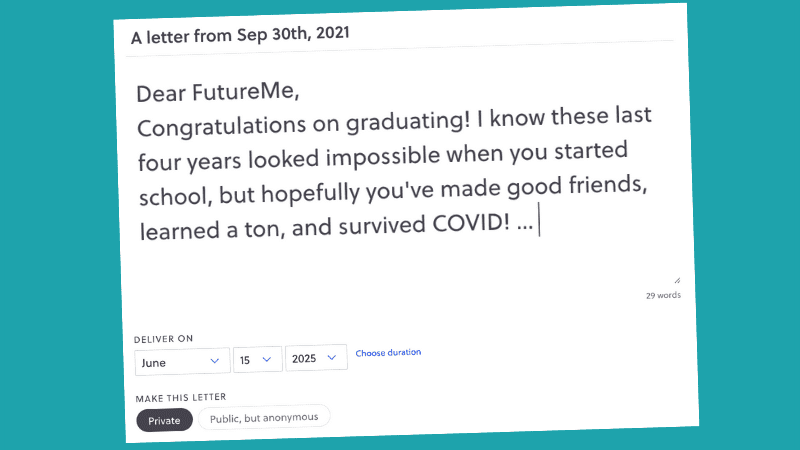
Create a custom “Letters to the Future” experience for your students! Teachers can sign up today for free with code WEARETEACHERS.
Community building is essential to any classroom’s success. And, if you’re going to accomplish anything in an upper grade classroom, you really have to work on student engagement, especially now. This means that teachers have to dig into two toolboxes at all times: the “build community while being self-reflective” activities and the one labeled “OMG can y’all believe how exciting this activity is?!”
Over the years, I’ve assigned writing assignments to help build community. They’ve changed to avoid duplication of other classes and prompts, and this year, I decided to have students write a letter to their future self. That’s when I found FutureMe in the classroom , which fit in both of those toolboxes above!
The idea is simple: you create a single page for students to type a letter to their future self, which the site then delivers electronically on the future date that you or the students set. Students only have to work in one text field, enter their email address, choose a delivery date, and send. It’s that easy.
Save time on your lesson planning
My reality as an educator, like many of yours, is difficult to describe right now. My planning time is booked from now till February, by which time I should be caught up on September’s grading! That was a solid plus for FutureMe. Once I started thinking about my prompt and how I wanted the students to interact with the site, it only took about 15 minutes to get everything ready.
Customize as little or as much as you’d like
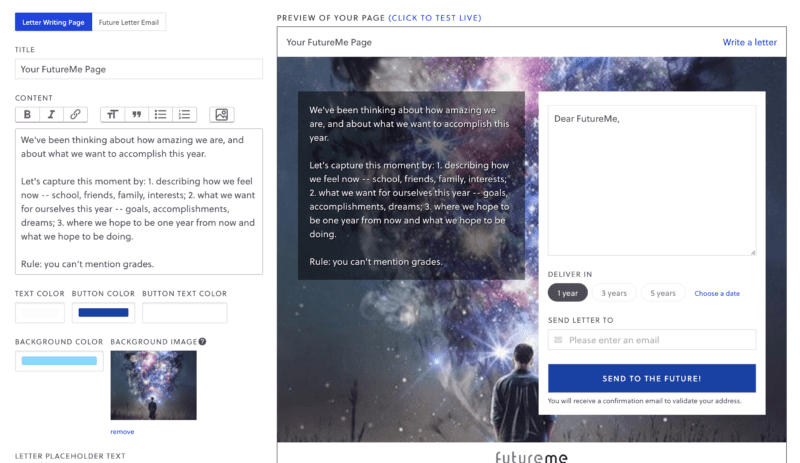
The live preview captures what you see as you edit.
The site is intuitive. As you customize the page that students will see, your updates appear live in a frame on the same tab. This is especially helpful if you want to modify the colors, which I did to match our school’s colors. It’s also easy to adjust the colors of the text and the “send” button. When you’re done, or if you just want to see the student page, just hit the Preview link.
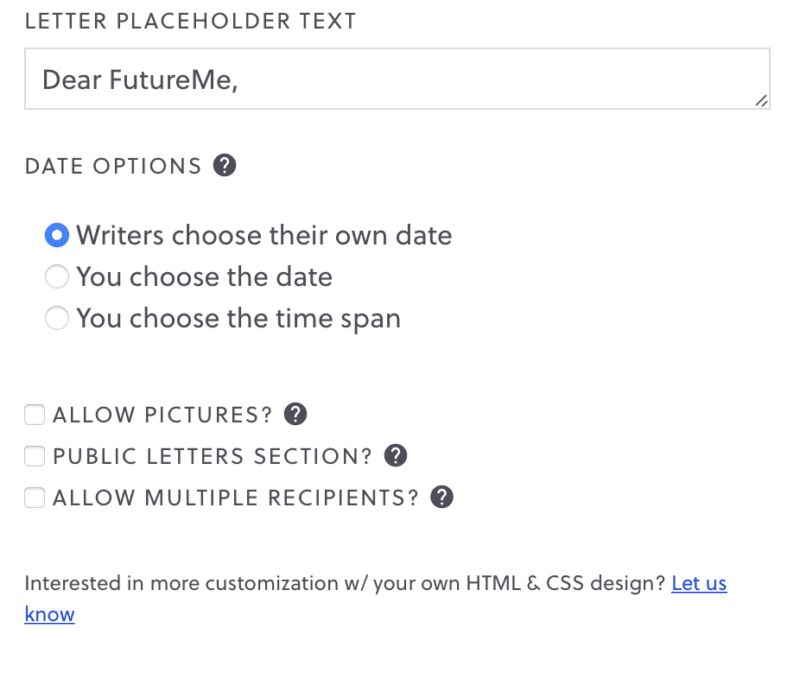
I set our work to private—only the students will see their emails (a few students sent them to their parents’ email addresses, too). This is a personal choice and it works for our classroom community, but you can adjust those settings with a click. You’re also able to choose between having the students choose their own date or setting it for them. For this assignment, I let the kids choose their date. I plan on going back to the site in a few weeks for a more formal assignment. For that, I’ll set the date for them. You can also choose to make letters available publicly by selecting which ones might be appropriate and interesting to share.
Discover effortless student engagement
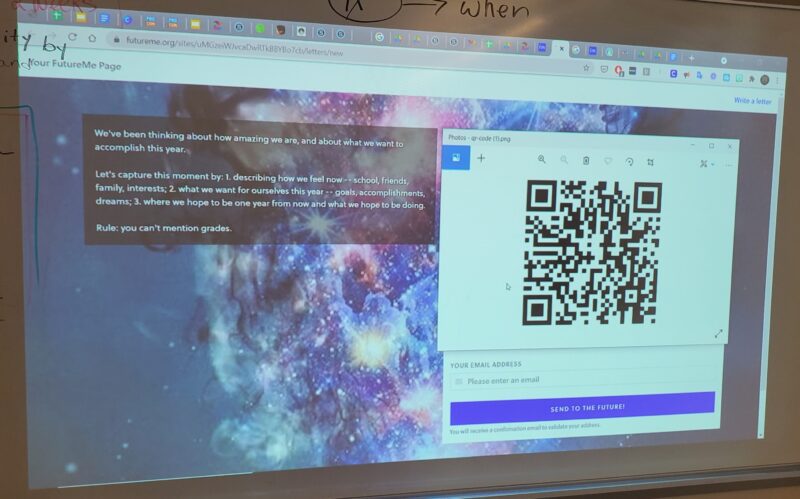
I made a QR code for the link for the students to scan using their devices, and the site loaded right up. Once the students were on the site, they knew exactly what to do. They played around with changing the delivery date and talked with each other about the choice they made. Questions included, “can I curse?” “can I send this to my mom, too?” and “can we do this next week, too?”
An important aspect of any Letter to My Future Self assignment is this magical idea that we have acted outside of time—that a future version of ourselves can interact with a past version of ourselves, connecting old to young, present to past, and spurring nostalgic feelings. When the kids finished, they pressed “Send to the Future,” and it was gone, like magic.
Think beyond the classroom prompt
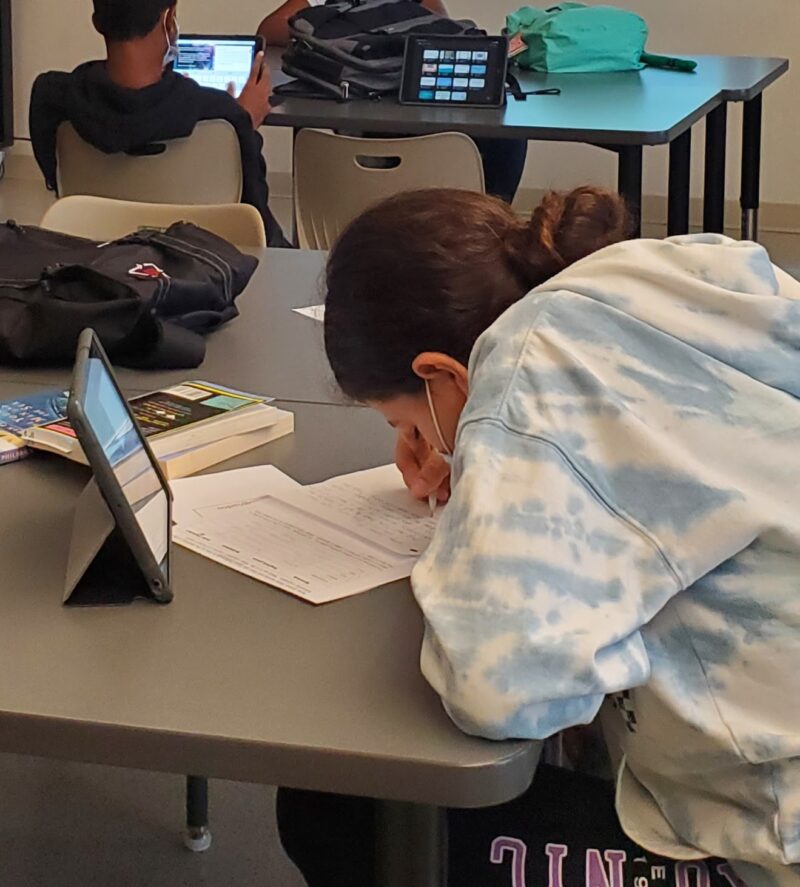
It’s great to have paper handy for those first drafts
Another plus for FutureMe, for sure—there was no teacher stuffing a letter into a yellow envelope with a promise to send on to a high school teacher or sealed and stamped envelopes stashed in a drawer to wait for a future postal worker. FutureMe maximizes student agency for a common activity, turning it from an old, wooden desk and paper envelope kind of thing into the familiar space of tech and social media actions. If you choose to make some of the letters public, you can expand the reach of the assignment even further.
Consider a variety of prompts to get students started. In each one, encourage students to think of themselves not just as students, but as human beings: sisters, brothers, friends, sons or daughters, creatives, athletes, leaders, etc.
- What is one thing you’d like to accomplish this year?
- Describe how you feel right now and what you enjoy doing.
- Where do you see yourself as a student in X length of time?
- What are you most proud of in your life so far? What do you want to be proud of in one year?
- Describe something you are struggling with right now, and describe what it might look like to have overcome it.
- Write a letter to give your future self some encouragement and love!
- How have you changed over the past few years, and how do you hope to change over the next few?
In future assignments, I will change the setting so I can read and grade or give feedback on them. The flexibility is important to me, and FutureMe provides exactly the kinds of focused choices that have a meaningful impact on the student’s experience. My students are looking forward to the next assignment, and so am I!
Getting started is easy, and it’s FREE with code “WEARETEACHERS.” Use your K-12 school email to enroll for one year for up to 200 students.
Learn more about FutureMe

You Might Also Like

16 Super Fun Spelling Games and Easy Ways To Get Ready for the Spelling Bee
Get your kids ready to “Rule the Word!” Continue Reading
Copyright © 2024. All rights reserved. 5335 Gate Parkway, Jacksonville, FL 32256

Recommended for you
An open letter to my favorite high school teacher, as my last day of high school speeds toward me, i have realized that i will miss more than just my peers..

To my favorite high school teacher,
Thank you for your encouragement. You held to the belief that all students have something to offer, and that the papers I wrote and the assignments I turned in were little assessment of my true character. You kept the gradebook and your opinion of me as a person separate, and because of this, I was never afraid of your judgment.
Thank you for your understanding. You could always tell when I was stressed out or had too much on my plate, and you understood why my effort sometimes did not reflect my achievements. You did not condemn me for this; you asked me if I was getting enough sleep and whether your assignments were too harsh, instead of wondering whether I was trying hard enough. Thank you for allowing my opinion to matter, but thank you that it did not matter too much.
Thank you for your interest. Thank you for asking me about my weekend, my health, and my future plans. Thank you for proving you cared about my life and whether I was doing well outside of your class. You treated me like your own child, and never let me think your compassion stopped as soon as the bell rang. I’m convinced it didn’t.
I know I was not the best student you ever had, but you treated me like my success meant something to you. I felt confident in my abilities to succeed, even in the instances I failed, because of you. But I also knew that you took pride in me when I proved your efforts for our class were not in vain. Your work reflected in me, and mine in you.
I wish we could stay in touch, but I know we can’t. I wish your class would not move on without me, that in three years you would not struggle to remember my name and in five my face, and that you would remember me like I will remember you. But I know that in a sea of hundreds of students, I will drown. And that’s okay.
Thank you for caring about me when you had the opportunity to. And thank you for not stopping with me.
One of your (many) favorites students.
Subscribe to our Newsletter
25 beatles lyrics: your go-to guide for every situation, the best lines from the fab four.
For as long as I can remember, I have been listening to The Beatles. Every year, my mom would appropriately blast “Birthday” on anyone’s birthday. I knew all of the words to “Back In The U.S.S.R” by the time I was 5 (Even though I had no idea what or where the U.S.S.R was). I grew up with John, Paul, George, and Ringo instead Justin, JC, Joey, Chris and Lance (I had to google N*SYNC to remember their names). The highlight of my short life was Paul McCartney in concert twice. I’m not someone to “fangirl” but those days I fangirled hard. The music of The Beatles has gotten me through everything. Their songs have brought me more joy, peace, and comfort. I can listen to them in any situation and find what I need. Here are the best lyrics from The Beatles for every and any occasion.
And in the end, the love you take is equal to the love you make
The End- Abbey Road, 1969
The sun is up, the sky is blue, it's beautiful and so are you
Dear Prudence- The White Album, 1968
Love is old, love is new, love is all, love is you
Because- Abbey Road, 1969
There's nowhere you can be that isn't where you're meant to be
All You Need Is Love, 1967
Life is very short, and there's no time for fussing and fighting, my friend
We Can Work It Out- Rubber Soul, 1965
He say, "I know you, you know me", One thing I can tell you is you got to be free
Come Together- Abbey Road, 1969
Oh please, say to me, You'll let me be your man. And please say to me, You'll let me hold your hand
I Wanna Hold Your Hand- Meet The Beatles!, 1964
It was twenty years ago today, Sgt. Pepper taught the band to play. They've been going in and out of style, but they're guaranteed to raise a smile
Sgt. Pepper's Lonely Hearts Club Band-1967
Living is easy with eyes closed, misunderstanding all you see
Strawberry Fields Forever- Magical Mystery Tour, 1967
Can you hear me? When it rains and shine, it's just a state of mind
Rain- Paperback Writer "B" side, 1966
Little darling, it's been long cold lonely winter. Little darling, it feels like years since it' s been here. Here comes the sun, Here comes the sun, and I say it's alright
Here Comes The Sun- Abbey Road, 1969
We danced through the night and we held each other tight, and before too long I fell in love with her. Now, I'll never dance with another when I saw her standing there
Saw Her Standing There- Please Please Me, 1963
I love you, I love you, I love you, that's all I want to say
Michelle- Rubber Soul, 1965
You say you want a revolution. Well you know, we all want to change the world
Revolution- The Beatles, 1968
All the lonely people, where do they all come from. All the lonely people, where do they all belong
Eleanor Rigby- Revolver, 1966
Oh, I get by with a little help from my friends
With A Little Help From My Friends- Sgt. Pepper's Lonely Hearts Club Band, 1967
Hey Jude, don't make it bad. Take a sad song and make it better
Hey Jude, 1968
Yesterday, all my troubles seemed so far away. Now it looks as though they're here to stay. Oh, I believe in yesterday
Yesterday- Help!, 1965
And when the brokenhearted people, living in the world agree, there will be an answer, let it be.
Let It Be- Let It Be, 1970
And anytime you feel the pain, Hey Jude, refrain. Don't carry the world upon your shoulders
I'll give you all i got to give if you say you'll love me too. i may not have a lot to give but what i got i'll give to you. i don't care too much for money. money can't buy me love.
Can't Buy Me Love- A Hard Day's Night, 1964
All you need is love, love is all you need
All You Need Is Love- Magical Mystery Tour, 1967
Whisper words of wisdom, let it be
Blackbird singing in the dead of night, take these broken wings and learn to fly. all your life, you were only waiting for this moment to arise.
Blackbird- The White Album, 1968
Though I know I'll never lose affection, for people and things that went before. I know I'll often stop and think about them. In my life, I love you more
In My Life- Rubber Soul, 1965
While these are my 25 favorites, there are quite literally 1000s that could have been included. The Beatles' body of work is massive and there is something for everyone. If you have been living under a rock and haven't discovered the Fab Four, you have to get musically educated. Stream them on Spotify, find them on iTunes or even buy a CD or record (Yes, those still exist!). I would suggest starting with 1, which is a collection of most of their #1 songs, or the 1968 White Album. Give them chance and you'll never look back.
14 Invisible Activities: Unleash Your Inner Ghost!
Obviously the best superpower..
The best superpower ever? Being invisible of course. Imagine just being able to go from seen to unseen on a dime. Who wouldn't want to have the opportunity to be invisible? Superman and Batman have nothing on being invisible with their superhero abilities. Here are some things that you could do while being invisible, because being invisible can benefit your social life too.
1. "Haunt" your friends.
Follow them into their house and cause a ruckus.
2. Sneak into movie theaters.
Going to the cinema alone is good for your mental health , says science
Considering that the monthly cost of subscribing to a media-streaming service like Netflix is oft...
Free movies...what else to I have to say?
3. Sneak into the pantry and grab a snack without judgment.
Late night snacks all you want? Duh.
4. Reenact "Hollow Man" and play Kevin Bacon.
America's favorite son? And feel what it's like to be in a MTV Movie Award nominated film? Sign me up.
5. Wear a mask and pretend to be a floating head.
Just another way to spook your friends in case you wanted to.
6. Hold objects so they'll "float."
"Oh no! A floating jar of peanut butter."
7. Win every game of hide-and-seek.
Just stand out in the open and you'll win.
8. Eat some food as people will watch it disappear.
Even everyday activities can be funny.
9. Go around pantsing your friends.
Even pranks can be done; not everything can be good.
10. Not have perfect attendance.
You'll say here, but they won't see you...
11. Avoid anyone you don't want to see.
Whether it's an ex or someone you hate, just use your invisibility to slip out of the situation.
12. Avoid responsibilities.
Chores? Invisible. People asking about social life? Invisible. Family being rude? Boom, invisible.
13. Be an expert on ding-dong-ditch.
Never get caught and have the adrenaline rush? I'm down.
14. Brag about being invisible.
Be the envy of the town.
But don't, I repeat, don't go in a locker room. Don't be a pervert with your power. No one likes a Peeping Tom.
Good luck, folks.
19 Lessons I'll Never Forget from Growing Up In a Small Town
There have been many lessons learned..
Small towns certainly have their pros and cons. Many people who grow up in small towns find themselves counting the days until they get to escape their roots and plant new ones in bigger, "better" places. And that's fine. I'd be lying if I said I hadn't thought those same thoughts before too. We all have, but they say it's important to remember where you came from. When I think about where I come from, I can't help having an overwhelming feeling of gratitude for my roots. Being from a small town has taught me so many important lessons that I will carry with me for the rest of my life.
1. The importance of traditions.
Sometimes traditions seem like a silly thing, but the fact of it is that it's part of who you are. You grew up this way and, more than likely, so did your parents. It is something that is part of your family history and that is more important than anything.
2. How to be thankful for family and friends.
No matter how many times they get on your nerves or make you mad, they are the ones who will always be there and you should never take that for granted.
3. How to give back.
When tragedy strikes in a small town, everyone feels obligated to help out because, whether directly or indirectly, it affects you too. It is easy in a bigger city to be able to disconnect from certain problems. But in a small town those problems affect everyone.
4. What the word "community" really means.
Along the same lines as #3, everyone is always ready and willing to lend a helping hand when you need one in a small town and to me that is the true meaning of community. It's working together to build a better atmosphere, being there to raise each other up, build each other up, and pick each other up when someone is in need. A small town community is full of endless support whether it be after a tragedy or at a hometown sports game. Everyone shows up to show their support.
5. That it isn't about the destination, but the journey.
People say this to others all the time, but it takes on a whole new meaning in a small town. It is true that life is about the journey, but when you're from a small town, you know it's about the journey because the journey probably takes longer than you spend at the destination. Everything is so far away that it is totally normal to spend a couple hours in the car on your way to some form of entertainment. And most of the time, you're gonna have as many, if not more, memories and laughs on the journey than at the destination.
6. The consequences of making bad choices.
Word travels fast in a small town, so don't think you're gonna get away with anything. In fact, your parents probably know what you did before you even have a chance to get home and tell them. And forget about being scared of what your teacher, principle, or other authority figure is going to do, you're more afraid of what your parents are gonna do when you get home.
7. To trust people, until you have a reason not to.
Everyone deserves a chance. Most people don't have ill-intentions and you can't live your life guarding against every one else just because a few people in your life have betrayed your trust.
8. To be welcoming and accepting of everyone.
While small towns are not always extremely diverse, they do contain people with a lot of different stories, struggle, and backgrounds. In a small town, it is pretty hard to exclude anyone because of who they are or what they come from because there aren't many people to choose from. A small town teaches you that just because someone isn't the same as you, doesn't mean you can't be great friends.
9. How to be my own, individual person.
In a small town, you learn that it's okay to be who you are and do your own thing. You learn that confidence isn't how beautiful you are or how much money you have, it's who you are on the inside.
10. How to work for what I want.
Nothing comes easy in life. They always say "gardens don't grow overnight" and if you're from a small town you know this both figuratively and literally. You certainly know gardens don't grow overnight because you've worked in a garden or two. But you also know that to get to the place you want to be in life it takes work and effort. It doesn't just happen because you want it to.
11. How to be great at giving directions.
If you're from a small town, you know that you will probably only meet a handful of people in your life who ACTUALLY know where your town is. And forget about the people who accidentally enter into your town because of google maps. You've gotten really good at giving them directions right back to the interstate.
12. How to be humble.
My small town has definitely taught me how to be humble. It isn't always about you, and anyone who grows up in a small town knows that. Everyone gets their moment in the spotlight, and since there's so few of us, we're probably best friends with everyone so we are as excited when they get their moment of fame as we are when we get ours.
13. To be well-rounded.
Going to a small town high school definitely made me well-rounded. There isn't enough kids in the school to fill up all the clubs and sports teams individually so be ready to be a part of them all.
14. How to be great at conflict resolution.
In a small town, good luck holding a grudge. In a bigger city you can just avoid a person you don't like or who you've had problems with. But not in a small town. You better resolve the issue fast because you're bound to see them at least 5 times a week.
15. The beauty of getting outside and exploring.
One of my favorite things about growing up in a rural area was being able to go outside and go exploring and not have to worry about being in danger. There is nothing more exciting then finding a new place somewhere in town or in the woods and just spending time there enjoying the natural beauty around you.
16. To be prepared for anything.
You never know what may happen. If you get a flat tire, you better know how to change it yourself because you never know if you will be able to get ahold of someone else to come fix it. Mechanics might be too busy , or more than likely you won't even have enough cell service to call one.
17. That you don't always have to do it alone.
It's okay to ask for help. One thing I realized when I moved away from my town for college, was how much my town has taught me that I could ask for help is I needed it. I got into a couple situations outside of my town where I couldn't find anyone to help me and found myself thinking, if I was in my town there would be tons of people ready to help me. And even though I couldn't find anyone to help, you better believe I wasn't afraid to ask.
18. How to be creative.
When you're at least an hour away from normal forms of entertainment such as movie theaters and malls, you learn to get real creative in entertaining yourself. Whether it be a night looking at the stars in the bed of a pickup truck or having a movie marathon in a blanket fort at home, you know how to make your own good time.
19. To brush off gossip.
It's all about knowing the person you are and not letting others influence your opinion of yourself. In small towns, there is plenty of gossip. But as long as you know who you really are, it will always blow over.
Grateful Beyond Words: A Letter to My Inspiration
I have never been so thankful to know you..
I can't say "thank you" enough to express how grateful I am for you coming into my life. You have made such a huge impact on my life. I would not be the person I am today without you and I know that you will keep inspiring me to become an even better version of myself.
You have taught me that you don't always have to strong. You are allowed to break down as long as you pick yourself back up and keep moving forward. When life had you at your worst moments, you allowed your friends to be there for you and to help you. You let them in and they helped pick you up. Even in your darkest hour you showed so much strength. I know that you don't believe in yourself as much as you should but you are unbelievably strong and capable of anything you set your mind to.
Your passion to make a difference in the world is unbelievable. You put your heart and soul into your endeavors and surpass any personal goal you could have set. Watching you do what you love and watching you make a difference in the lives of others is an incredible experience. The way your face lights up when you finally realize what you have accomplished is breathtaking and I hope that one day I can have just as much passion you have.
SEE MORE: A Letter To My Best Friend On Her Birthday
The love you have for your family is outstanding. Watching you interact with loved ones just makes me smile . You are so comfortable and you are yourself. I see the way you smile when you are around family and I wish I could see you smile like this everyday. You love with all your heart and this quality is something I wished I possessed.
You inspire me to be the best version of myself. I look up to you. I feel that more people should strive to have the strength and passion that you exemplify in everyday life.You may be stubborn at points but when you really need help you let others in, which shows strength in itself. I have never been more proud to know someone and to call someone my role model. You have taught me so many things and I want to thank you. Thank you for inspiring me in life. Thank you for making me want to be a better person.
Waitlisted for a College Class? Here's What to Do!
Dealing with the inevitable realities of college life..
Course registration at college can be a big hassle and is almost never talked about. Classes you want to take fill up before you get a chance to register. You might change your mind about a class you want to take and must struggle to find another class to fit in the same time period. You also have to make sure no classes clash by time. Like I said, it's a big hassle.
This semester, I was waitlisted for two classes. Most people in this situation, especially first years, freak out because they don't know what to do. Here is what you should do when this happens.
Don't freak out
This is a rule you should continue to follow no matter what you do in life, but is especially helpful in this situation.
Email the professor
Around this time, professors are getting flooded with requests from students wanting to get into full classes. This doesn't mean you shouldn't burden them with your email; it means they are expecting interested students to email them. Send a short, concise message telling them that you are interested in the class and ask if there would be any chance for you to get in.
Attend the first class
Often, the advice professors will give you when they reply to your email is to attend the first class. The first class isn't the most important class in terms of what will be taught. However, attending the first class means you are serious about taking the course and aren't going to give up on it.
Keep attending class
Every student is in the same position as you are. They registered for more classes than they want to take and are "shopping." For the first couple of weeks, you can drop or add classes as you please, which means that classes that were once full will have spaces. If you keep attending class and keep up with assignments, odds are that you will have priority. Professors give preference to people who need the class for a major and then from higher to lower class year (senior to freshman).
Have a backup plan
For two weeks, or until I find out whether I get into my waitlisted class, I will be attending more than the usual number of classes. This is so that if I don't get into my waitlisted class, I won't have a credit shortage and I won't have to fall back in my backup class. Chances are that enough people will drop the class, especially if it is very difficult like computer science, and you will have a chance. In popular classes like art and psychology, odds are you probably won't get in, so prepare for that.
Remember that everything works out at the end
Life is full of surprises. So what if you didn't get into the class you wanted? Your life obviously has something else in store for you. It's your job to make sure you make the best out of what you have.
Trending Topics
Songs About Being 17 Grey's Anatomy Quotes Vine Quotes 4 Leaf Clover Self Respect
Top Creators
1. Brittany Morgan, National Writer's Society 2. Radhi, SUNY Stony Brook 3. Kristen Haddox , Penn State University 4. Jennifer Kustanovich , SUNY Stony Brook 5. Clare Regelbrugge , University of Illinois Urbana-Champaign
Trending Stories
Nostalgic 2000s songs: 100 throwback hits that'll transport you to childhood, 19 things you can do when you turn 19 years old, every greek house has a god or goddess, what it means to be from the "dmv", 45 throwback songs you forgot about, best of student life top 10 reasons my school rocks, 70 of the most referenced movies ever, 7 new year clichés: break free, embrace change, the ultimate birthday: unveiling the perfect day to celebrate, unleash inspiration: 15 relatable disney lyrics, subscribe to our newsletter, facebook comments.
Sample Teacher Request Letter to Principal from Parent
In this guide, I’ll provide a step-by-step approach, along with customizable templates , to help you write an effective teacher request letter to your principal.
Key Takeaways: Understand the purpose: Requesting a specific teacher for your child. Gather necessary information: Teacher’s name, child’s details, reasons for request. Format the letter professionally: Clear, concise, and polite. State your request early in the letter. Provide specific reasons for your choice. Show appreciation for the principal’s consideration. Close with a polite call to action. Proofread and edit before sending.
Understanding the Purpose of Your Letter
Before you start writing, it’s crucial to understand why you’re writing this letter. Typically, parents write to request a specific teacher who they believe will be the best fit for their child’s learning style, personality, or educational needs.
Real-Life Example:
In my case, I wrote to request Mr. Johnson, an innovative math teacher whose teaching style matched my son’s learning preferences.
Step-by-Step Guide to Writing Your Letter
Step 1: gather necessary information.
- Child’s details: Name, grade, and any pertinent information about their learning needs.
- Teacher’s details: Full name and any relevant achievements or qualifications.
- Reasons for request: Specific examples of why this teacher is a good fit.
Step 2: Format the Letter Professionally
- Header: Your contact information, date, principal’s name, and school address.
- Salutation: A formal greeting, e.g., “Dear Principal Smith,”
Step 3: Clearly State Your Request
- First paragraph: Briefly introduce yourself and clearly state your request.
Step 4: Provide Specific Reasons
- Body: Explain why you believe this teacher is the best choice for your child.
- Example: “Mr. Johnson’s hands-on approach to math has helped many students like my son who thrive in interactive learning environments.”
Step 5: Show Appreciation
- Acknowledge the principal’s efforts in managing teacher assignments.
Step 6: Close With a Polite Call to Action
- Closing: A polite request for consideration, e.g., “I appreciate your consideration of this request.”
- Signature: Your name and contact information.
Final Steps: Proofread and Edit
Ensure your letter is free from errors, as this reflects your professionalism and seriousness about the request.
Teacher Request Letter To Principal Template
[Your Name] [Your Address] [City, State, Zip Code] [Email Address] [Phone Number] [Date]
Trending Now: Find Out Why!
[Principal’s Name] [School Name] [School Address] [City, State, Zip Code]
Dear [Principal’s Name],
I am writing to you as the [parent/guardian] of [Child’s Name], who is currently in [Child’s Current Grade/Class] at [School Name]. I am reaching out to discuss [Child’s Name]’s classroom placement and teacher assignment for the upcoming academic year.
Firstly, I would like to express my appreciation for the hard work and dedication demonstrated by the staff and teachers at [School Name].
[Child’s Name] has enjoyed and benefited greatly from the learning environment at the school, particularly [mention any specific positive experience or teacher interaction, if applicable].
The purpose of my letter is to request [specific request, e.g., a particular teacher, a specific teaching style, or a classroom environment] for [Child’s Name].
This request stems from [provide specific reasons, such as learning style, educational needs, past experiences with certain teaching methods, or any other relevant factor].
I believe that [Child’s Name] will thrive best in an environment that [describe the type of environment or teaching style you believe will benefit your child].
[Optional: Provide a brief anecdote or example to illustrate your point]. It is my hope that such a setting will foster [Child’s Name]’s academic growth and enthusiasm for learning.
I understand that teacher assignments are complex and involve numerous considerations. I trust your judgment and the school’s policies in these matters.
My intent is not to impose, but rather to provide information that may assist in making an informed decision regarding [Child’s Name]’s educational experience.
I am available to discuss this matter further at your convenience. I can be reached at [Your Phone Number] or [Your Email Address].
Thank you for your time and attention to this request, and for your ongoing commitment to the students at [School Name].
[Your Full Name]
Dear Principal Smith,
I am Jane Done, the mother of Emily Doe in grade 3B. I am writing to discuss the teacher assignment for the upcoming school year…
Writing a teacher request letter to the principal is an art that balances respect, clarity, and personal touch. By following this guide, you’re well-equipped to craft a letter that respectfully conveys your concerns and requests.
Comments Request:
I’d love to hear your experiences and tips on writing a teacher request letter. Have you tried this approach before? Share your stories and suggestions in the comments below!
Frequently Asked Questions (FAQs)

Q: What Should I Include in a Teacher Request Letter to the Principal?
Answer: In my experience, a successful teacher request letter should include a brief introduction of yourself and your child, a clear statement of your request, specific reasons for requesting a particular teacher, and an expression of gratitude for the principal’s consideration. Remember to keep the tone respectful and professional.
Q: How Formal Should My Letter Be?
Answer: It’s essential to maintain a formal tone throughout your letter. Address the principal respectfully, use a formal salutation like “Dear Principal [Last Name],” and close your letter formally with phrases like “Sincerely” or “Regards.”
My letter balanced formality with a personal touch, which I believe made it more effective.
Q: Is It Okay to State Specific Reasons for My Preference?
Answer: Absolutely. In fact, providing specific reasons for your teacher preference strengthens your request. When I wrote my letter, I mentioned how the teacher’s teaching style aligned with my child’s learning needs.
It’s important, however, to keep your reasons focused on your child’s academic and social development.
Q: Should I Mention My Child’s Past Experiences or Needs?
Answer: Yes, mentioning your child’s past academic experiences, learning styles, or special needs can provide context for your request.
In my letter, I included a brief mention of my child’s learning style and how the requested teacher’s methods could benefit him. This helps the principal understand the basis of your request.
Q: How Long Should the Letter Be?
Answer: Keep it concise. A one-page letter is typically sufficient. When I wrote my letter, I focused on being clear and brief, providing just enough information to convey my request effectively without overwhelming the principal with unnecessary details.
Q: Can I Request a Meeting to Discuss My Letter?
Answer: Yes, you can suggest a meeting for further discussion, but do so politely. In my letter, I included a line like, “I am available for a meeting at your convenience to discuss this request further.” This shows your willingness to engage in open communication.
Q: How Soon Should I Follow Up After Sending the Letter?
Answer: Give the principal reasonable time to respond, usually a week or two. In my case, I waited for two weeks before sending a polite follow-up email. It’s important to be patient and respectful of the principal’s time.
Related Articles
Parent introduction letter to teacher sample: free & effective, sample request letter for documents in school: free & effective, co-parenting agreement letter sample: free & effective, short parenting letter to kids: free & effective, simple request letter sample for school, child care hardship letter sample: free & effective, leave a comment cancel reply.
Your email address will not be published. Required fields are marked *
A Letter to my High School Self

Dear Maddie,
Hey me my senior year of high school, I’m writing to you three years later as a junior in college! I know you’re probably super stressed right now from juggling school, extracurriculars and choosing where to go to college but I hope that by writing you this letter, as a junior in college now, I could ease your stress a little and give you a few tips.

First off, just take a deep breath because everything is going to be alright. Listen, no matter where you choose to go to college, you will have the best time and make the absolute most of it. You will make new friends, meet new people, join clubs, learn so many new things and learn to love the independence that comes with leaving for college. I can promise you that! I know that college decisions and SAT scores are the only things that seem to matter right now, but in a few months no one will care what score you got on that math section of your SAT.
Relax and enjoy your senior year! Sometimes you can be so busy with school and life that you forget to sit back and enjoy life in the moment! You’re never going to get these high school days back so have fun and enjoy them. Spend time with your friends and classmates, enjoy time with your family and your pets at home, and savor the last few months sleeping in your bed at home and taking a shower in your own shower. (I promise communal bathrooms aren’t that bad though!)

Here’s a few tips for when you do start college. Do not be afraid to try new things and step out of your comfort zone. Seriously. I know everyone says this, but it’s true, college is the best place to try new things. And guess what? Everyone else will be trying these things for the first time too. Join clubs, meet people, take interesting classes, say yes to as much as you possibly can!
Also, start researching about what you might want to do after college as soon as you can so you can have a solid plan for your college years. You don’t have to have it all figured out by any means, just try to think of a few solid ideas that interest you and how you can get there. Explore different classes and clubs as much as possible to help with that!
So, I hope I could ease your stress a little bit and provide a few tips that will help you for the next few years. But don’t stress because take it from me - it will all turn out okay!
Your Future Self

An official website of the United States government
Here's how you know
The .gov means it's official. Federal government websites often end in .gov or .mil. Before sharing sensitive information, make sure you’re on a federal government site.
The site is secure. The https:// ensures that you are connecting to the official website and that any information you provide is encrypted and transmitted securely.
What the New Overtime Rule Means for Workers

One of the basic principles of the American workplace is that a hard day’s work deserves a fair day’s pay. Simply put, every worker’s time has value. A cornerstone of that promise is the Fair Labor Standards Act ’s (FLSA) requirement that when most workers work more than 40 hours in a week, they get paid more. The Department of Labor ’s new overtime regulation is restoring and extending this promise for millions more lower-paid salaried workers in the U.S.
Overtime protections have been a critical part of the FLSA since 1938 and were established to protect workers from exploitation and to benefit workers, their families and our communities. Strong overtime protections help build America’s middle class and ensure that workers are not overworked and underpaid.
Some workers are specifically exempt from the FLSA’s minimum wage and overtime protections, including bona fide executive, administrative or professional employees. This exemption, typically referred to as the “EAP” exemption, applies when:
1. An employee is paid a salary,
2. The salary is not less than a minimum salary threshold amount, and
3. The employee primarily performs executive, administrative or professional duties.
While the department increased the minimum salary required for the EAP exemption from overtime pay every 5 to 9 years between 1938 and 1975, long periods between increases to the salary requirement after 1975 have caused an erosion of the real value of the salary threshold, lessening its effectiveness in helping to identify exempt EAP employees.
The department’s new overtime rule was developed based on almost 30 listening sessions across the country and the final rule was issued after reviewing over 33,000 written comments. We heard from a wide variety of members of the public who shared valuable insights to help us develop this Administration’s overtime rule, including from workers who told us: “I would love the opportunity to...be compensated for time worked beyond 40 hours, or alternately be given a raise,” and “I make around $40,000 a year and most week[s] work well over 40 hours (likely in the 45-50 range). This rule change would benefit me greatly and ensure that my time is paid for!” and “Please, I would love to be paid for the extra hours I work!”
The department’s final rule, which will go into effect on July 1, 2024, will increase the standard salary level that helps define and delimit which salaried workers are entitled to overtime pay protections under the FLSA.
Starting July 1, most salaried workers who earn less than $844 per week will become eligible for overtime pay under the final rule. And on Jan. 1, 2025, most salaried workers who make less than $1,128 per week will become eligible for overtime pay. As these changes occur, job duties will continue to determine overtime exemption status for most salaried employees.

The rule will also increase the total annual compensation requirement for highly compensated employees (who are not entitled to overtime pay under the FLSA if certain requirements are met) from $107,432 per year to $132,964 per year on July 1, 2024, and then set it equal to $151,164 per year on Jan. 1, 2025.
Starting July 1, 2027, these earnings thresholds will be updated every three years so they keep pace with changes in worker salaries, ensuring that employers can adapt more easily because they’ll know when salary updates will happen and how they’ll be calculated.
The final rule will restore and extend the right to overtime pay to many salaried workers, including workers who historically were entitled to overtime pay under the FLSA because of their lower pay or the type of work they performed.
We urge workers and employers to visit our website to learn more about the final rule.
Jessica Looman is the administrator for the U.S. Department of Labor’s Wage and Hour Division. Follow the Wage and Hour Division on Twitter at @WHD_DOL and LinkedIn . Editor's note: This blog was edited to correct a typo (changing "administrator" to "administrative.")
- Wage and Hour Division (WHD)
- Fair Labor Standards Act
- overtime rule
SHARE THIS:


IMAGES
VIDEO
COMMENTS
Letter To Teacher Assignment. Letter to Teacher AssignmentDue: __________________. Your task is to write me a letter, introducing yourself to me. Your information needs to be as specific as possible. Your letter must be neat and easy to read ! Remember to do your best writing; the letter will tell me information about you, but it will also give ...
Amanda is a full-time teacher author after spending thirteen years in the classroom. She writes curriculumfor the high school level, coaches teachers 1:1, and travels with her family whenever possible. Amanda's obsessed with poetry, argumentation, and showing students the power of taking chances in their writing.
Greeting, should be polite and refer to the teacher by the name your child uses. Introduce yourself and your child ensure you indicate your names. Have a brief statement of the matter in question. Request for information if need be. Request for a meeting if need be. Have a polite ending and sign your email.
Your letter should follow this format: Begin with a salutation: Dear , Paragraph One: Include information about yourself, (Don't assume your teacher remembers you). Include your purpose in writing. Paragraph Two: Include how the teacher inspired you and instances in the class you were in that truly shaped your experience in a positive way.
Begin your letter by addressing your teacher respectfully. Use their formal title (e.g., Mr., Mrs., Miss, or Ms.) followed by their last name. This sets a respectful tone and shows that you value their role as an educator. 2. Clearly State the Purpose. Be clear and concise about the purpose of your letter.
Here are 10 steps to follow for how to write a letter to your teacher. Choose the appropriate format: Decide whether you want to write a physical letter or an email. Email is faster, but a physical letter can be more personal and meaningful. Address your teacher: Begin the letter with the teacher's name and title (e.g., "Dear Mrs. Johnson").
Use a professional greeting by using your teacher's title, like Mr., Mrs., or Coach. An appropriate greeting will look like this: Dear {teacher's title} {teacher's name,}. Tell your teacher why you are writing: Begin your letter with these words: "I am writing to tell you" and state your idea. This might look like, "I am writing to ...
For the actual assignment, they turned in their letters in sealed, self-addressed, stamped envelopes. I didn't read the letters. They were not for me; it was an assignment for my students. It was a credit/no credit final assignment. On the day they wrote the letters in class, they were engaged.
Write your name and the date in the upper right corner. Include your first and last name. The date will help your teacher know when you wrote the letter. [1] Your teacher may cherish the letter for years to come. Including your name and the date will help them remember who wrote the letter. 3.
Letter Writing Lesson Tip #3: Discuss Tone. The audience you choose for your students' letters will determine the tone that students need to take in their writing. But make sure to acknowledge that tone will change depending on the letter and the audience. A letter to grandma will read differently than a letter to a congressperson or to a ...
1. FICTION AS A SPRINGBOARD. Have students write as if they were a character from a piece of fiction you have been reading in class. Choosing a dramatic point in the plot, ask students to imagine they are one of the characters writing a letter to another character in the story.
3. Compose a first draft. Use the information you collected to write a draft email to your child's teacher. This gives you time to completely state your concerns, consider what you've written and make changes. [5] Avoid writing the email address in the "to" field so that you don't accidentally send the first draft.
Dear [Teacher's Name], I hope this letter finds you well. I wanted to take a moment to express my sincere gratitude for being such an amazing teacher. Your dedication, passion, and commitment to our education have made a profound impact on my learning journey, and I want to thank you for everything you do.
So, thank you to all the teachers out there. To show you how powerful you are, as individuals and as a profession, here are a collection of 'Thank-You' letters written by students thanking the teacher who, in his or her inimitable way, changed their lives for the better. Dear Sir, I hated you when I first met you.
A parent or guardian of a high school student with ADHD. HOW SHOULD IT BE USED? Before the school year begins, write a letter that introduces your teen to the people involved in his or her education. Think about who at your teen's school would most benefit from receiving this letter, e.g., your teen's teacher(s), advisor, special education
Start the year in writing with routines, rigor, and links by assigning a Letter to the Teacher. Here is your step by step walk-thru. Initiate to year in writing with habits, rigor, and relationships by assigning a Letter to the Teacher.
As a professional school counselor for nearly a decade, I've read hundreds of parent-teacher emails. The good, the bad, and the ugly. I've done the hard work for you and crafted a sample email (free for you to download) to effectively address: A cademic concerns. Attendance concerns. Behavior concerns.
An important aspect of any Letter to My Future Self assignment is this magical idea that we have acted outside of time—that a future version of ourselves can interact with a past version of ourselves, connecting old to young, present to past, and spurring nostalgic feelings. ... High School Teachers, Get Our Free Career Exploration Worksheets ...
John-Mark Kuznietsov. To my favorite high school teacher, Thank you for your encouragement. You held to the belief that all students have something to offer, and that the papers I wrote and the assignments I turned in were little assessment of my true character. You kept the gradebook and your opinion of me as a person separate, and because of ...
Step 1: Gather Necessary Information. Child's details: Name, grade, and any pertinent information about their learning needs. Teacher's details: Full name and any relevant achievements or qualifications. Reasons for request: Specific examples of why this teacher is a good fit.
A letter for the teacher template to kick off the school year! What better way to get to know your new class than by asking the students to write a letter for the teacher. This is a good resource to use during the first week with a new set of students as it offers a gentle task to get them feeling comfortable as they adapt to their new ...
Below are the three letters that will appear in the portal next to your assignments and their meaning. This will allow students and parents the ability to track assignment completion. At the end of the 4th quarter a grade will be posted. C-complete. NC-needs correction (in other words, partially complete)
Student Voices. A Letter to my High School Self. Dear Maddie, Hey me my senior year of high school, I'm writing to you three years later as a junior in college! I know you're probably super stressed right now from juggling school, extracurriculars and choosing where to go to college but I hope that by writing you this letter, as a junior in ...
This rule change would benefit me greatly and ensure that my time is paid for!" and "Please, I would love to be paid for the extra hours I work!" The department's final rule, which will go into effect on July 1, 2024, will increase the standard salary level that helps define and delimit which salaried workers are entitled to overtime ...